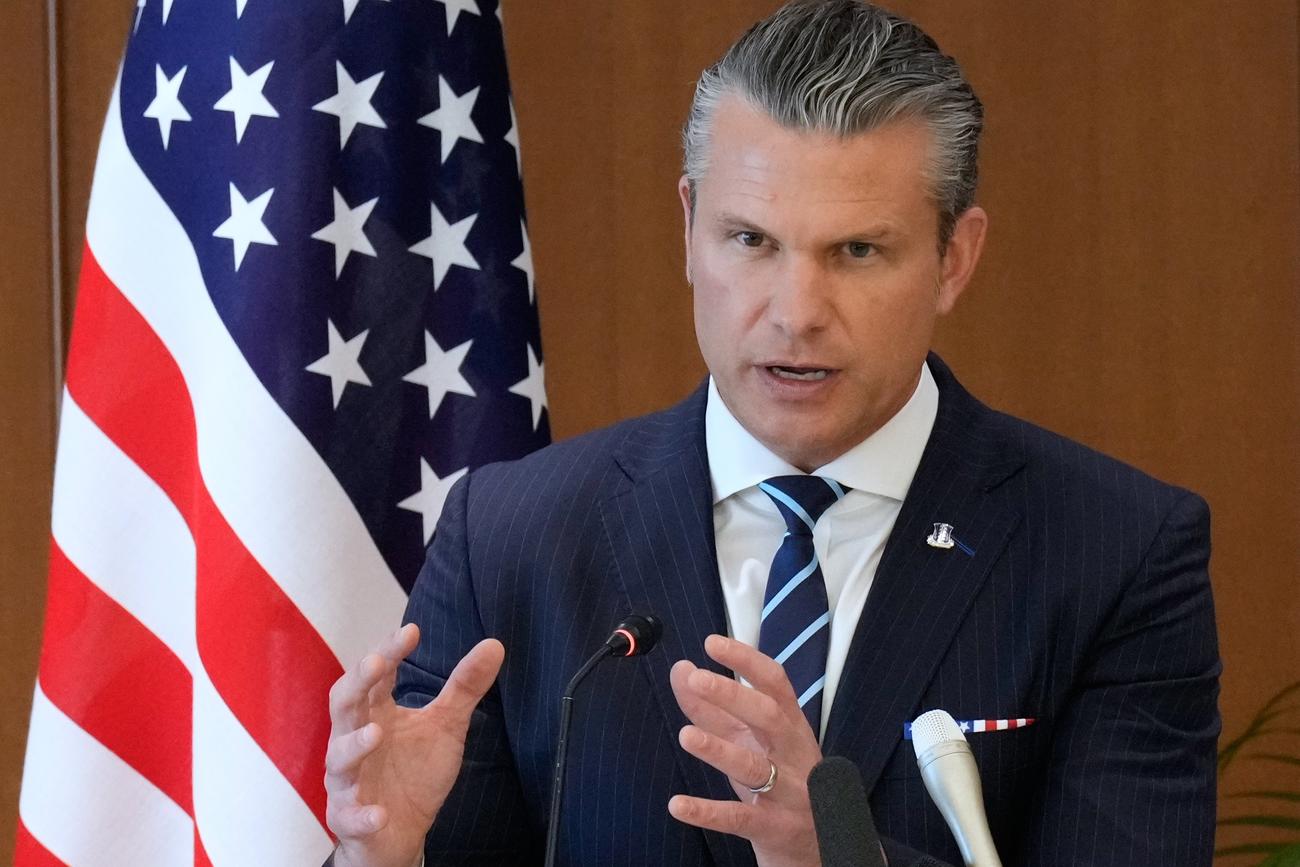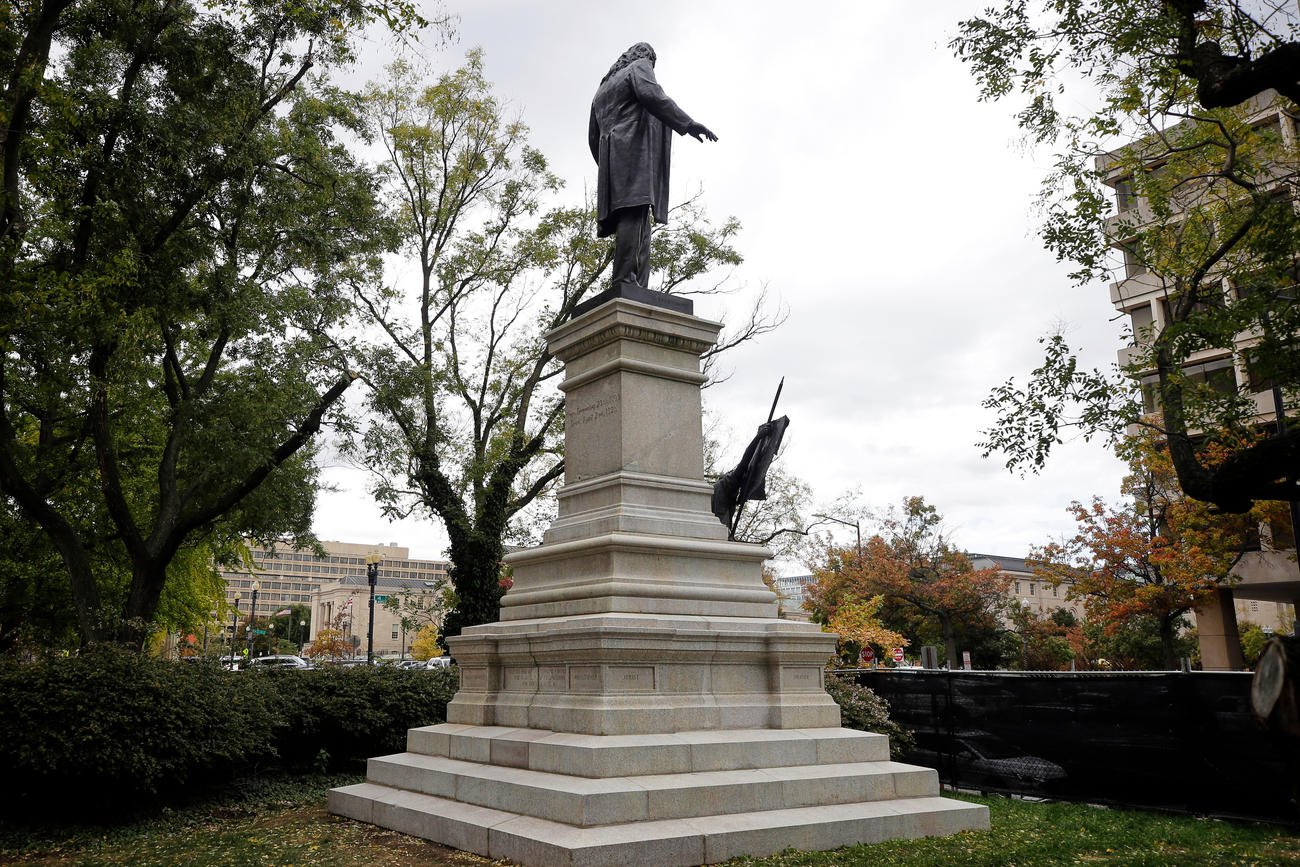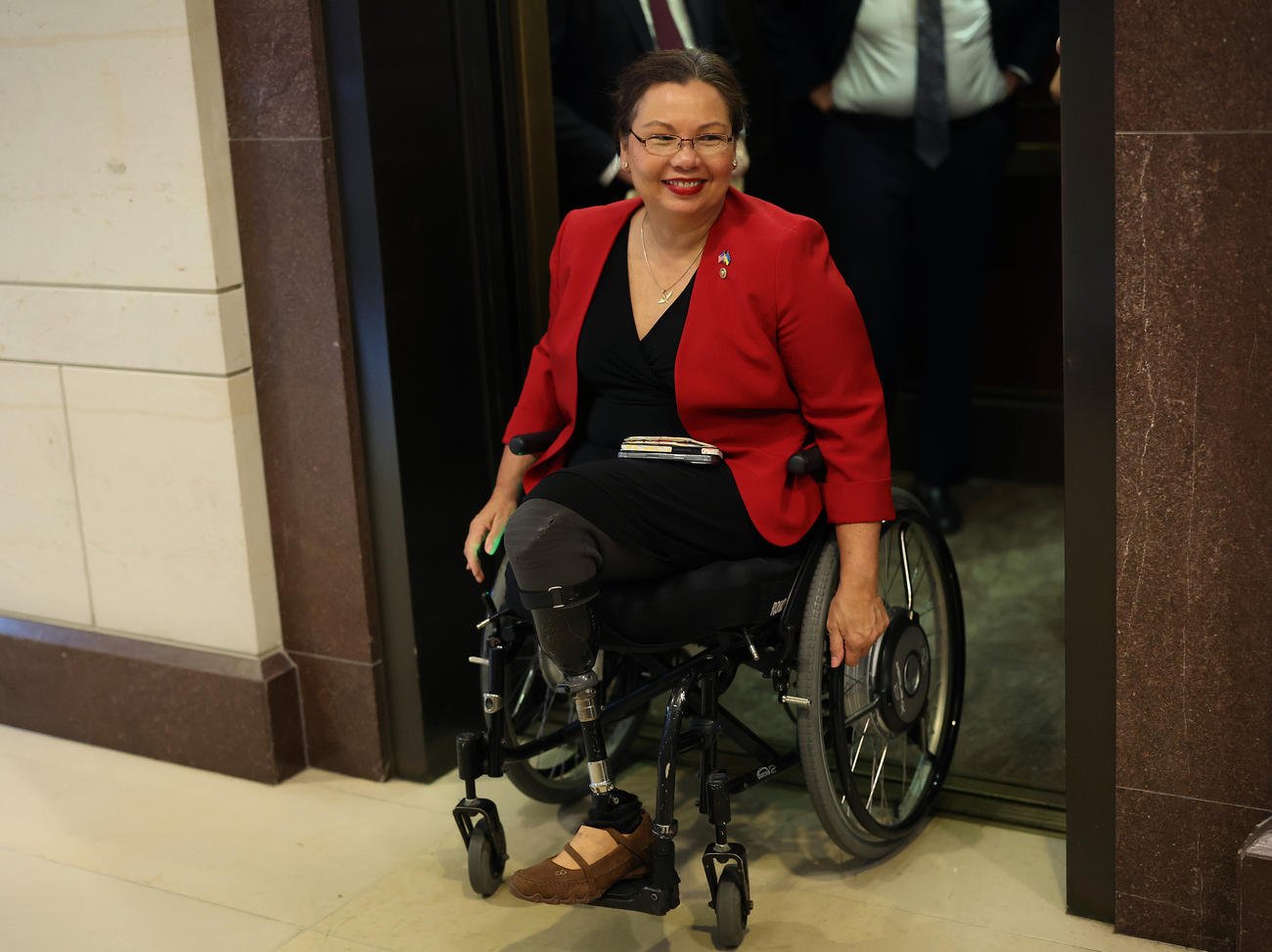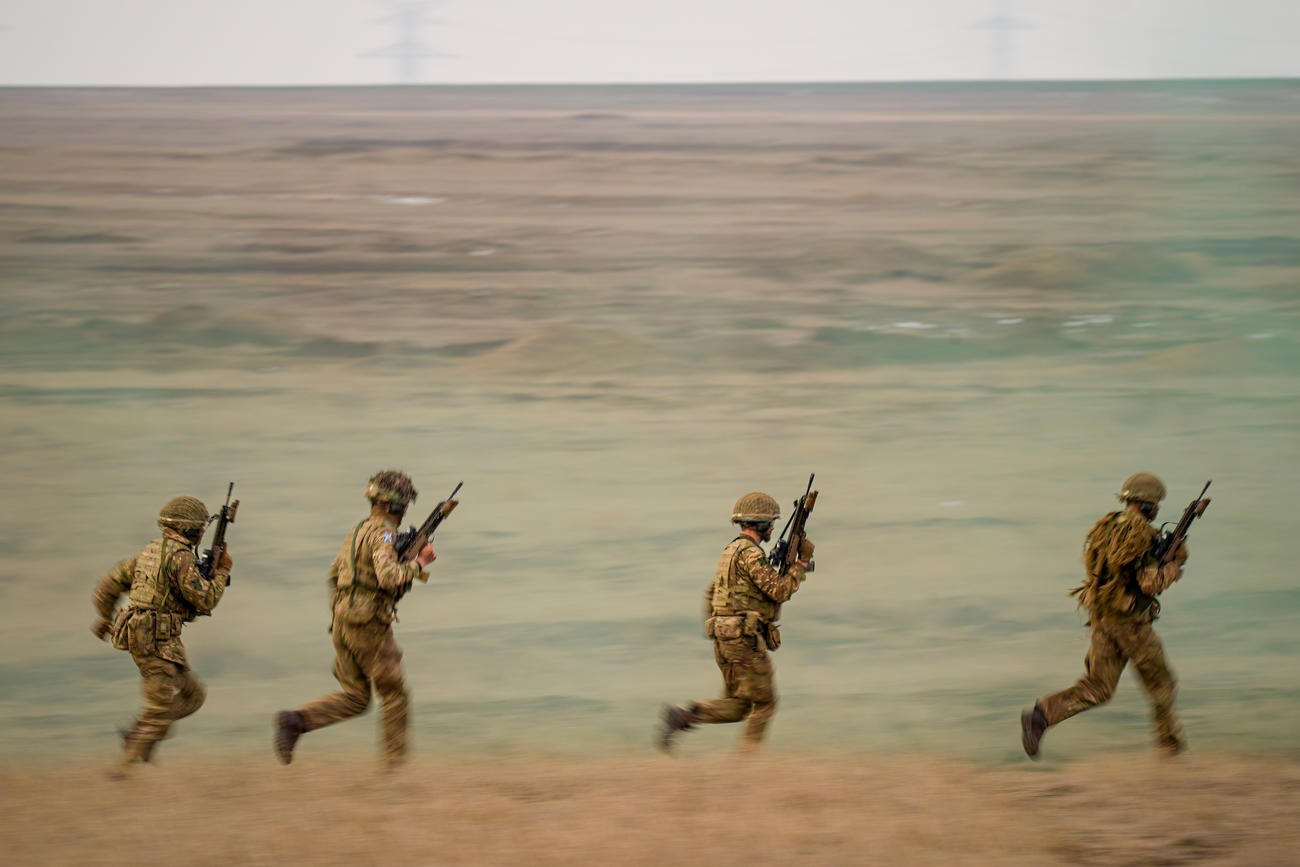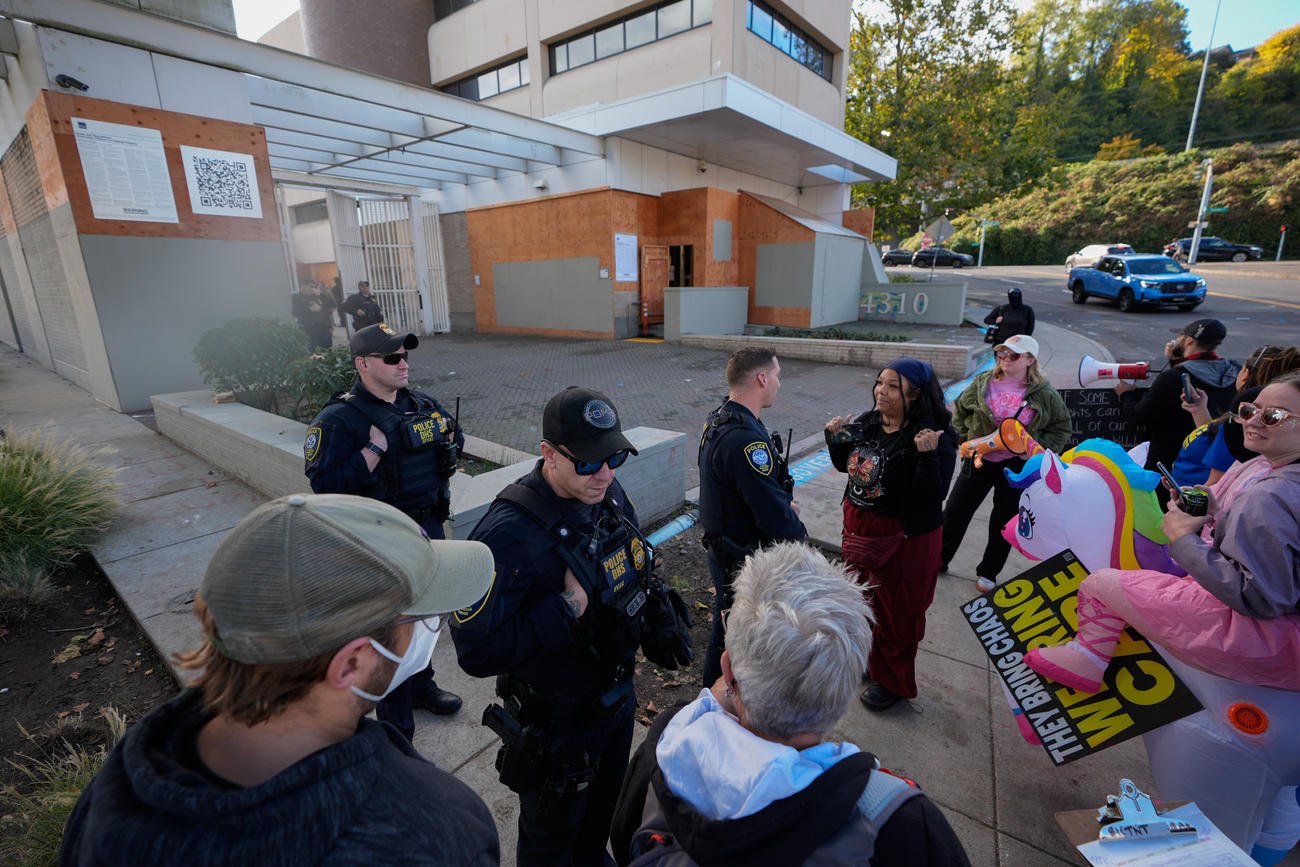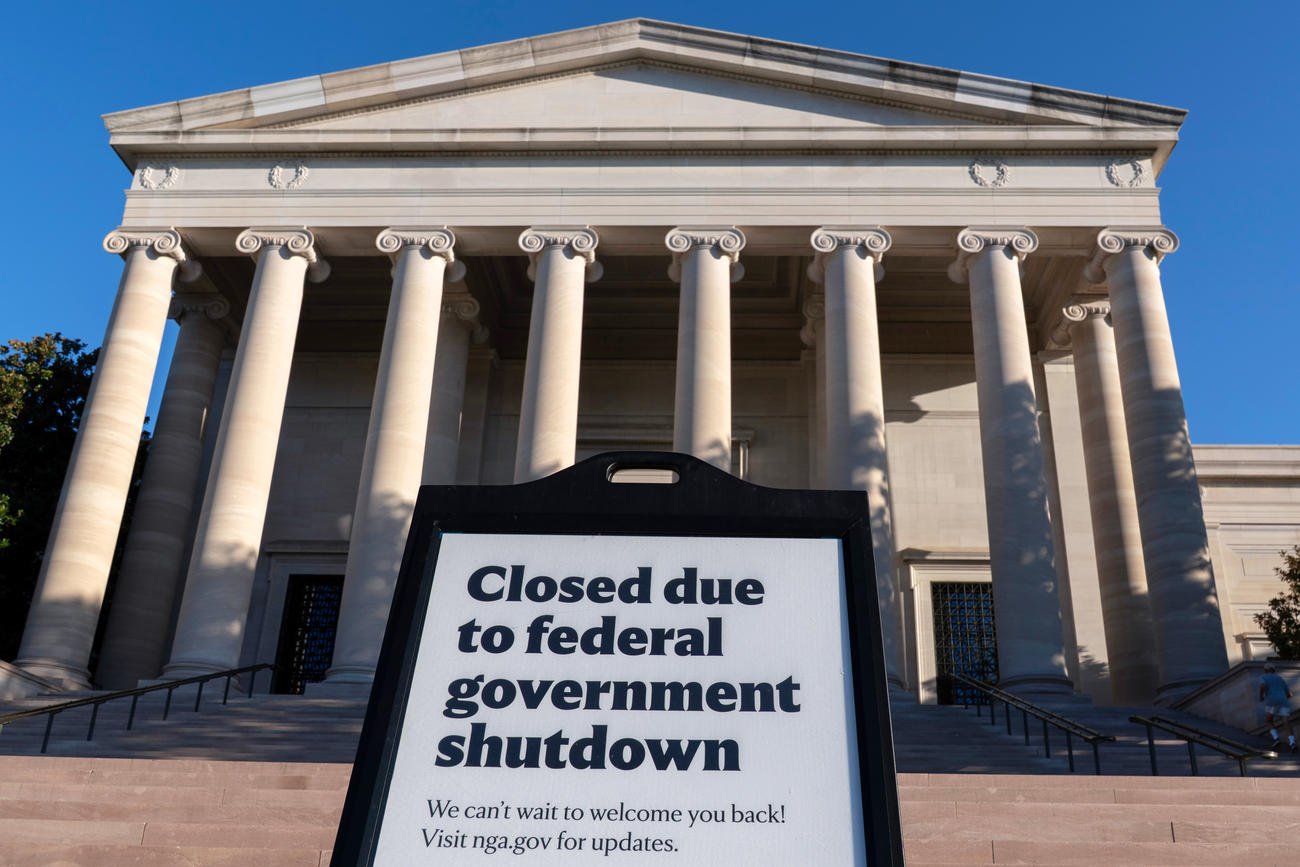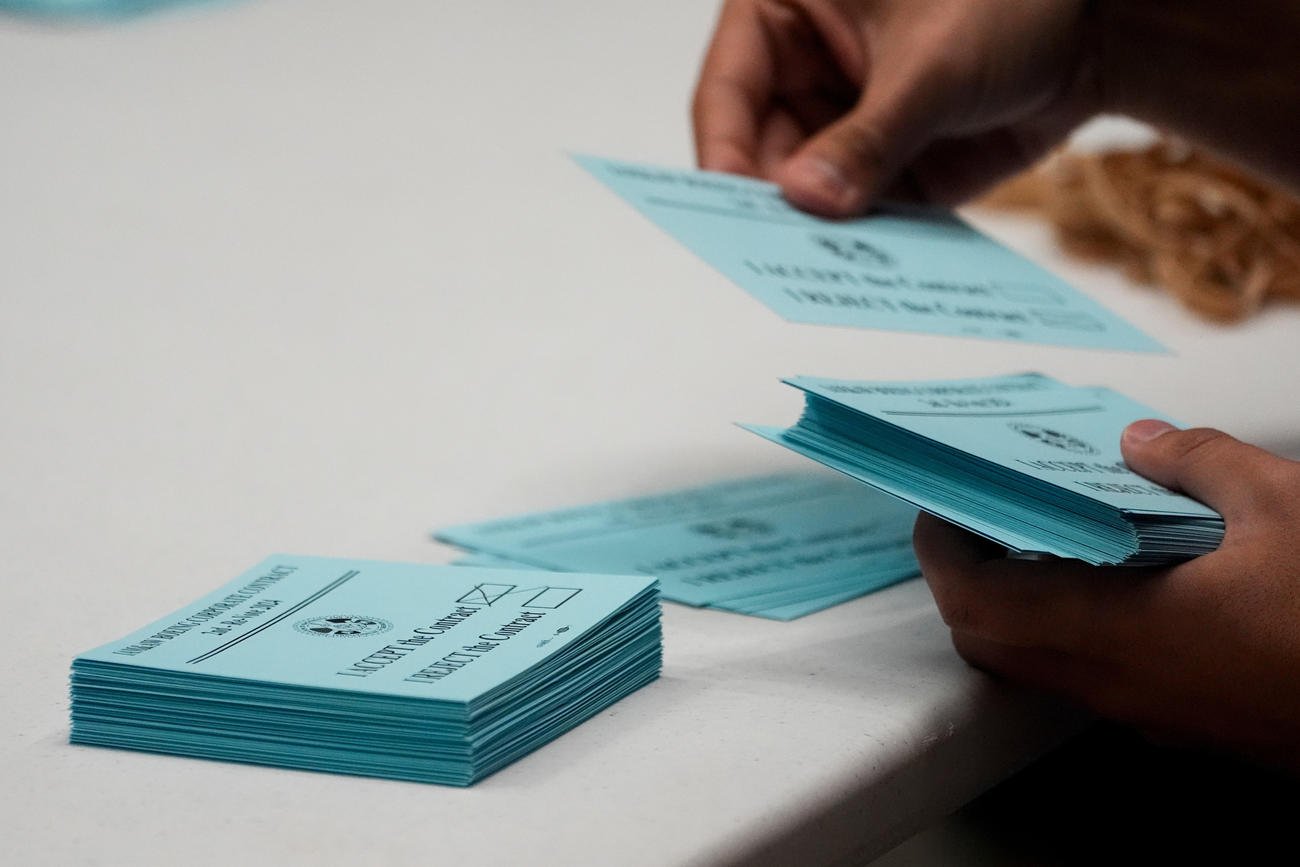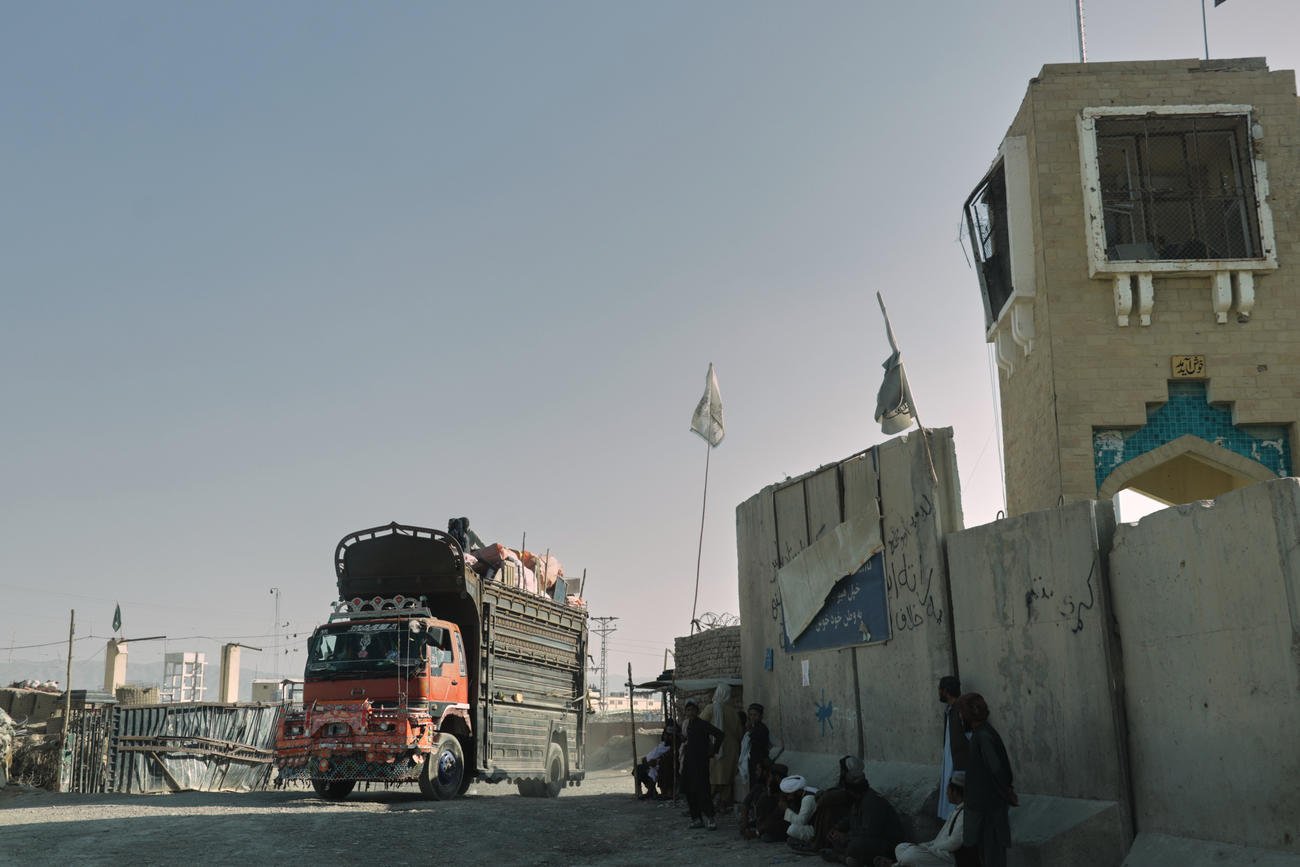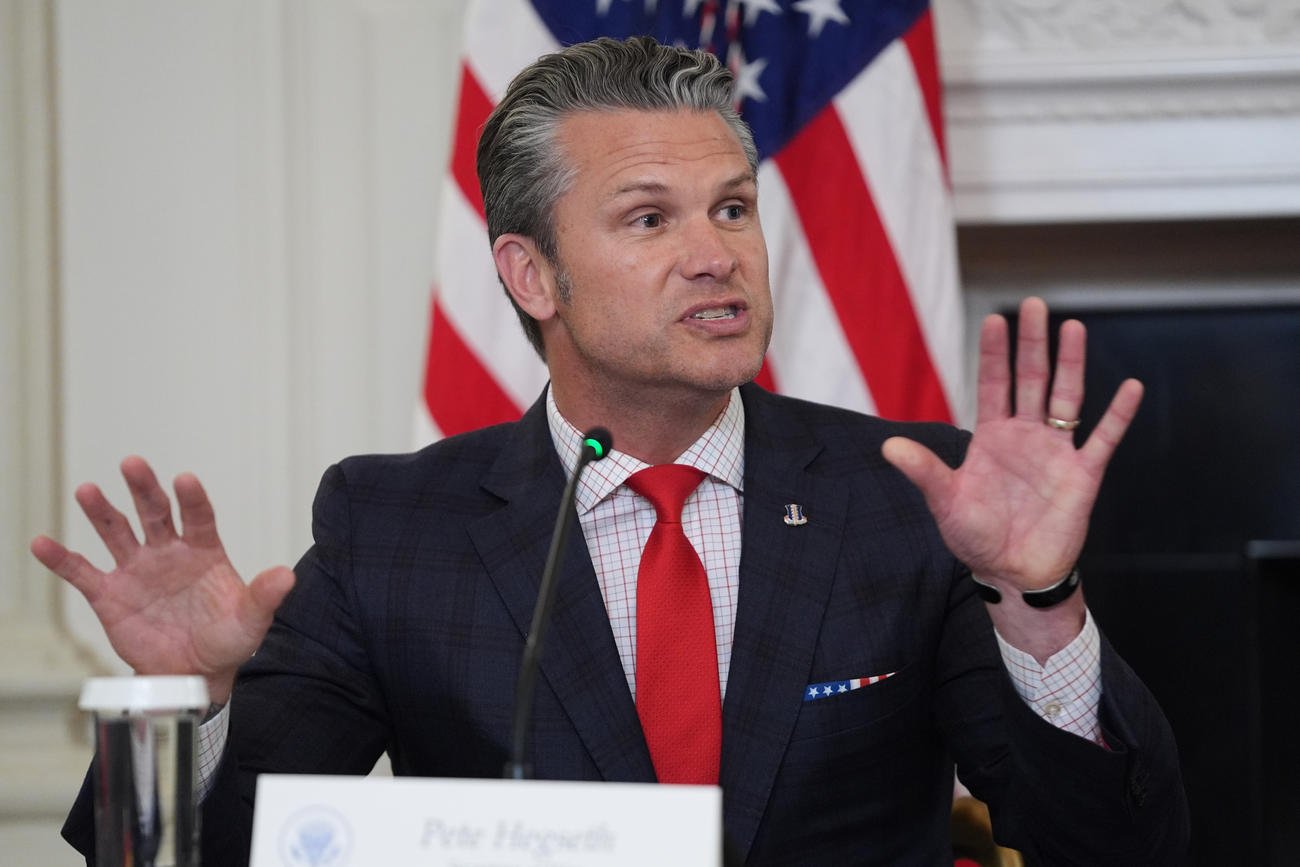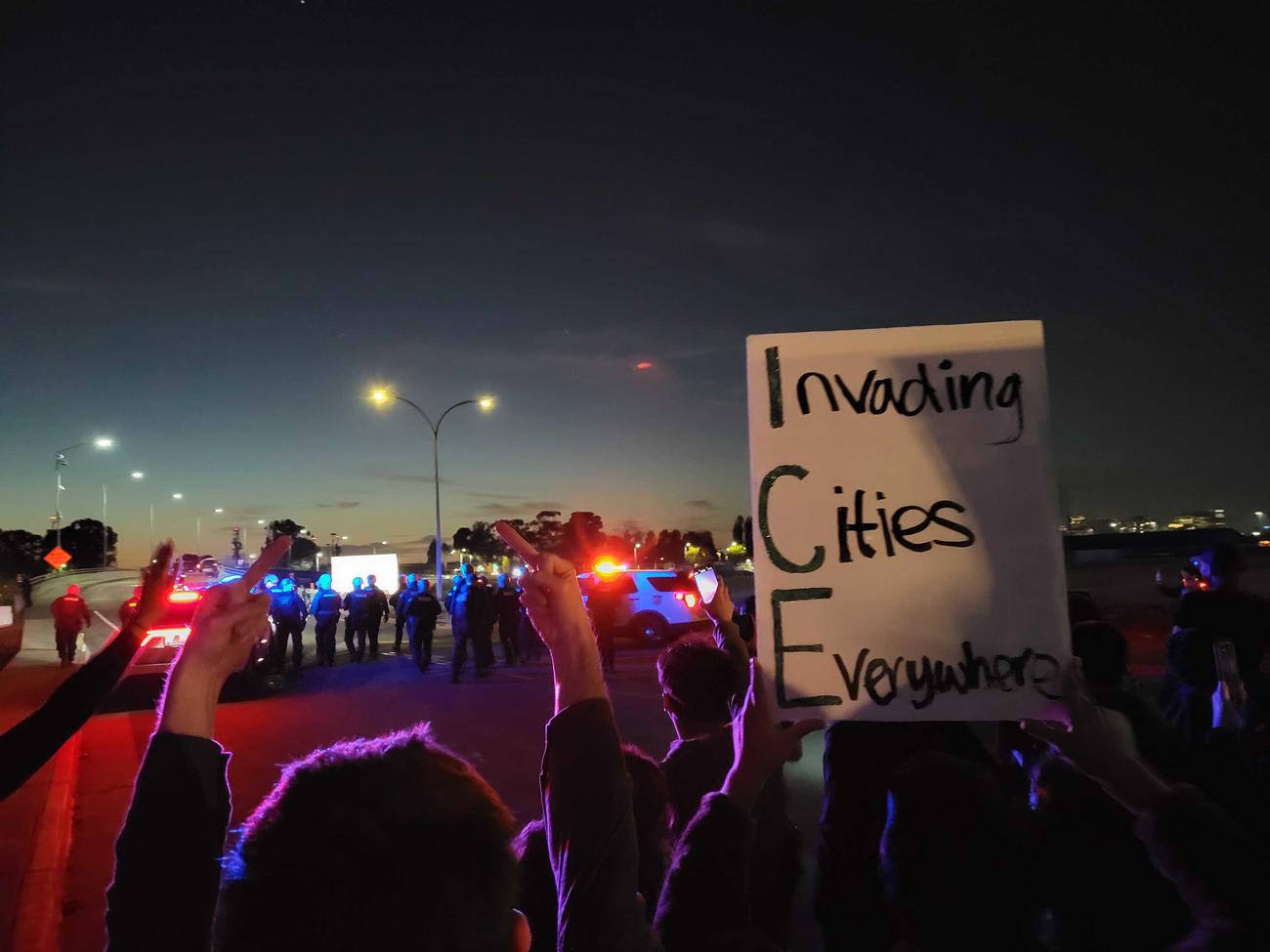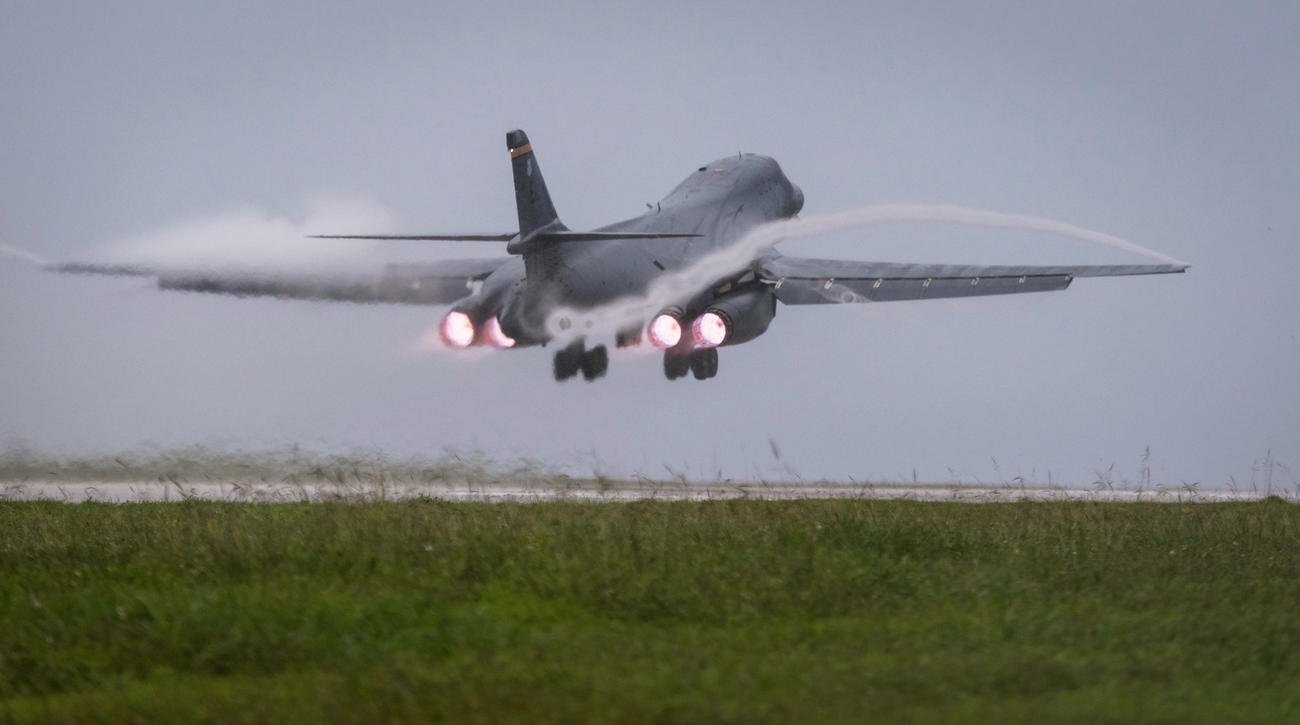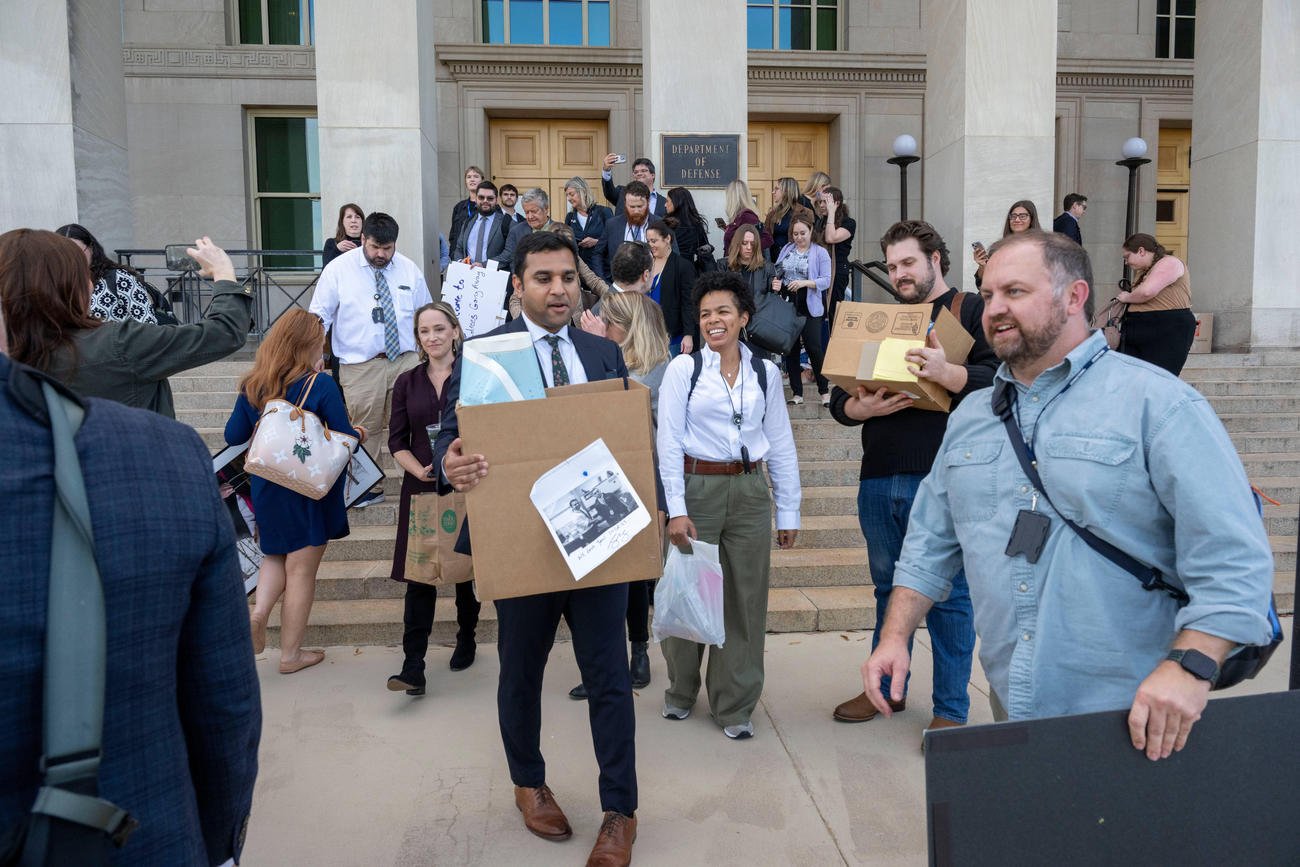Military Times News Feed
Thomas Robertson will get credit for the 13 months he has already spent in custody.
An off-duty Virginia police officer who stormed the U.S. Capitol on Jan, 6, 2021, with a fellow officer was sentenced Thursday to more than seven years in prison, matching the longest prison sentence so far among hundreds of Capitol riot cases. Former Rocky Mount Police Sgt. Thomas Robertson declined to address the court before U.S. District Judge Christopher Cooper sentenced him to seven years and three months in prison. Cooper also sentenced Robertson to three years of supervised release after his prison term. Federal prosecutors had recommended an eight-year prison sentence for Robertson. His sentence equals that of Guy Reffitt, a Texas man who attacked the Capitol while armed with a holstered handgun. Robertson gets credit for the 13 months he has already spent in custody. Robertson has been jailed since Cooper ruled last year that he violated the terms of his pretrial release by possessing firearms. The judge said he was troubled by Robertson’s conduct since his arrest — not only his stockpiling of guns but also his words advocating for violence. After Jan. 6, Robertson told a friend that he was prepared to fight and die in a civil war and he clung to baseless conspiracy theories that the 2020 election was stolen from then-President Donald Trump, the judge noted. Army Guardsman, first known service member, arrested after Capitol riot Sentencing guidelines calculated by Cooper recommended a prison term ranging from seven years and three months to nine years. “It’s a long time because it reflects the seriousness of the offenses that you were convicted of,” the judge said. In April, a jury convicted Robertson of attacking the Capitol to obstruct Congress from certifying Joe Biden’s 2020 presidential victory. Jurors found Robertson guilty of all six counts in his indictment, including charges that he interfered with police officers at the Capitol and that he entered a restricted area with a dangerous weapon, a large wooden stick. Robertson’s lawyers said the Army veteran was using the stick to help him walk because he has a limp from getting shot in the right thigh while working as a private contractor for the Defense Department in Afghanistan in 2011. The judge said he agreed with jurors that Robertson went to the Capitol to interfere with the joint session of Congress on Jan. 6. Robertson was an “active and willing participant,” not “some bystander” who got swept up in the crowd, Cooper said. Robertson traveled to Washington on that morning with another off-duty Rocky Mount police officer, Jacob Fracker, and a third man, a neighbor who wasn’t charged in the case. Fracker was scheduled to be tried alongside Robertson before he pleaded guilty to a conspiracy charge in March and agreed to cooperate with federal authorities. Cooper is scheduled to sentence Fracker next Tuesday. Prosecutors have asked Cooper to spare Fracker from a prison term and sentence him to six months of probation along with a period of home detention or “community confinement.” They said Fracker’s “fulsome” cooperation and trial testimony was crucial in securing convictions against Robertson. Robertson’s lawyer, Mark Rollins, sought a prison sentence below two years and three months. He questioned the fairness of the wide gap in sentences that prosecutors recommended for Robertson and Fracker given their similar conduct. Robertson served his country and community with distinction, his lawyer told the judge. “His life already is in shambles,” Rollins said. Robertson and Fracker were among several current or former law enforcement officers who joined in the riot. Prosecutors say Robertson used his law enforcement and military training to block police officers who were trying to hold off the advancing mob. Veteran gets prison for punching police during Capitol riot Assistant U.S. Attorney Elizabeth Aloi said Robertson was prepared for violence when he went to the Capitol and did a “victory lap” inside the building, where he posed for a selfie with Fracker. “The defendant is, by all accounts, proud of his conduct on Jan. 6,” she said. Jurors saw some of Robertson’s posts on social media before and after the riot. In a Facebook post on Nov. 7, 2020, Robertson said “being disenfranchised by fraud is my hard line.” “I’ve spent most of my adult life fighting a counter insurgency. (I’m) about to become part of one, and a very effective one,” he wrote. In a letter addressed to the judge, Robertson said he took full responsibility for his actions on Jan. 6 and “any poor decisions I made.” He blamed the vitriolic content of his social media posts on a mix of stress, alcohol abuse and “submersion in deep ‘rabbit holes’ of election conspiracy theory.” “I sat around at night drinking too much and reacting to articles and sites given to me by Facebook” algorithms, he wrote. The town fired Robertson and Fracker after the riot. Rocky Mount is about 25 miles south of Roanoke, Virginia, and has about 5,000 residents. Roughly 850 people have been charged with federal crimes for their conduct on Jan. 6. More than 350 of them have pleaded guilty, mostly to misdemeanor offenses, and more than 230 have been sentenced so far. Robertson’s jury trial was the second for a Capitol riot case; Reffitt’s was the first. Jurors have unanimously convicted seven Capitol rioters of all charges in their respective indictments.
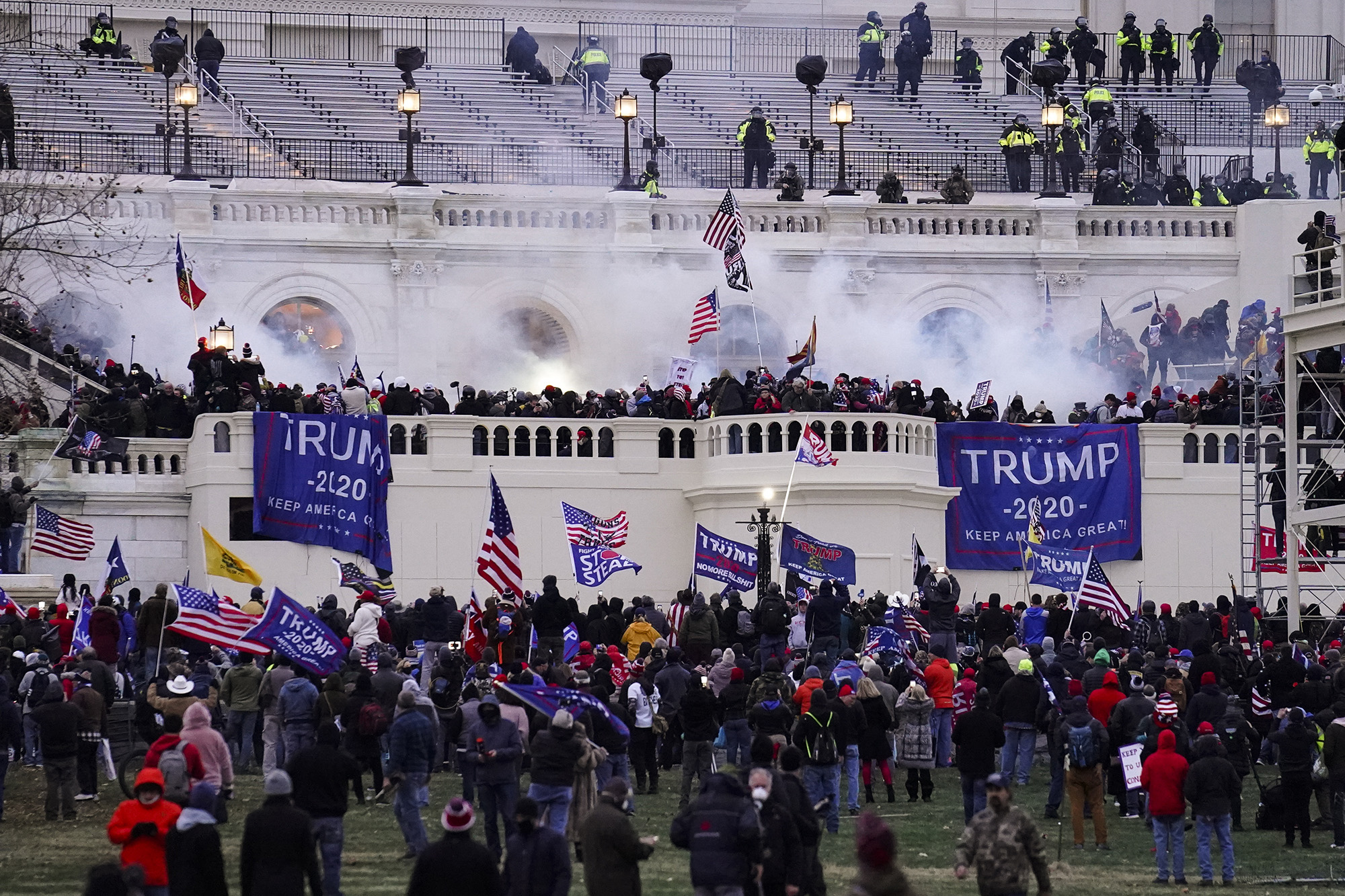
Biden called the PACT Act one of the most important changes to veteran support policies in decades.
Millions of veterans are now eligible for expanded health care access and disability benefits related to burn pit smoke and other toxic exposures after President Joe Biden signed into law Wednesday comprehensive new veterans legislation. In a White House ceremony, Biden called the legislation one of the most important changes to veteran support policies in decades, and said it will provide needed relief to individuals who are still suffering the wounds of war years after leaving the battlefield. “This is the most significant law our nation has ever passed to help millions of veterans who were exposed to toxic substances during their military service,” Biden said. The president was surrounded at the ceremony by veterans’ rights advocates, many of whom urged legislative action in recent years and, one week ago, held an around-the-clock vigil on the Capitol steps to pressure lawmakers to complete the bill. The bill eventually reached Biden’s desk after it passed in Congress on August 2 following an array of procedural moves by senators. “By signing this historic legislation, President Biden ensured health care access to help save the lives of countless veterans affected by toxic exposure,” retired Lt. Gen Mike Linnington, CEO of Wounded Warrior Project, said after the bill’s signing. “This is without a doubt a great day for veterans across America.” The Promise to Address Comprehensive Toxics Act — better known as the PACT Act — will be phased in over the next few years and provide new support for veterans from the Iraq and Afghanistan wars, the first Gulf War, the Vietnam War and a host of smaller deployments across the globe in between those campaigns. It is expected to total nearly $300 billion in new spending over the next decade, a figure that caused opposition from some conservative lawmakers in recent months, and will require the Department of Veterans Affairs to hire hundreds of new workers and open several new medical sites to handle the increased workload. “The PACT Act is the least we can do for the countless men and women … who suffer toxic exposure while serving their country,” Biden said. At the event, VA Secretary Denis McDonough shared that the “VA stands ready to implement PACT now,” directing veterans to VA.gov/PACT to learn more. Who benefits from the PACT Act Portions of the PACT Act that have garnered the most attention concern illnesses that stem from burn pits that were used in Iraq and Afghanistan to dispose of waste, including office equipment, vehicle parts, medical trash and other potentially toxic items. For years, veterans advocates have chronicled cases of respiratory illnesses and rare cancers among troops returning from those war zones, but have been unable to directly link such ailments to toxic smoke from fires because of a lack of air quality monitoring. As a result, many have been refused disability benefits from the VA for those sicknesses, claims which, in the past, have required strict scientific evidence to support. Under this new bill, however, that process will be amended. Any veterans who served in those areas will be granted presumptive status for 23 respiratory illnesses and cancers, speeding up the process to receive benefits — which can total several thousand dollars a month. The new bill also gives veterans who served in recent wars five more years of medical care coverage under the VA — they currently get five years — regardless of health status. Lawmakers said the extended time should help identify lingering health issues among veterans, which will ideally lead to faster and more reliable care. Veterans of pre-Global War on Terror conflicts will also see new support under the measure. The bill removes time restrictions placed on veterans from the first Gulf War while applying for similar toxic exposure benefits, adds hypertension and other conditions to the list of presumptive illnesses caused by Agent Orange exposure during the Vietnam War, and eases filing requirements for veterans exposed to radiation during various deployments around the globe. The measure would also codify recent changes in how the VA handles future toxic exposure claims, mandating a less rigid approach to the issue. Between 2007 and 2020, over 70 percent of disability claims related to burn pits were reportedly denied by the VA. Advocates claim that fair and fast responses to future war zone dangers could prevent a similar health care and disability fight. “It’s just surreal,” Rosie Lopez Torres, founder of the nonprofit Burn Pits 360, told Military Times following the signing. Torres’ husband is a former service member who suffers from constrictive bronchitis. “If you have symptoms, don’t doubt yourself. ... This is real.” Another requirement directs the VA to launch new studies on veteran health trends and a five-year strategic plan on toxic exposure research that could provide the insight and evidence advocates have been searching for. “We have every reason to believe that we’re going to see an expansion of the presumptive conditions,” McDonough told Military Times following the ceremony. A presidential connection Biden made burn pits a point of emphasis in his State of the Union speech earlier this year, saying Congress was long overdue to address the health problems of the youngest generation of veterans. He echoed those comments again during the signing Wednesday. “This new law matters,” Biden said. “It matters a great deal because these conditions have already taken such a toll on so many veterans and their families.” That rings true for military spouse Danielle Robinson, who joined the president on stage at the event and was a guest at the State of the Union. Robinson’s late husband Heath, from where the bill receives its official name, died at 39 from terminal stage four lung cancer that was attributed to toxic exposure from his deployment to Iraq as a combat medic. Biden’s late son Beau, the former attorney general of Delaware who served with the Delaware Army National Guard in Iraq, died in 2015 from a rare brain cancer. The president has indicated several times that he believes the illness may have been caused by exposure to burn pits, but no conclusive link has been made due to the same lack of scientific data that has frustrated many other military families. The Department of Defense estimates nearly 3.5 million troops who served in recent wars may have endured enough smoke exposure to cause health problems. That figure, combined with help for other generations of veterans included in the PACT Act, means that as many as one in five veterans living in America today could see some benefit from the legislation in coming years. Much has changed since 2008, a launching point for Military Times reporting on the harmful effects of burn pits, in terms of holding the military and government accountable for toxic exposure injuries. While advocates say there is much more to be done, the president considered the bill’s signing a major step in the right direction. “I was gonna get this done come hell or high water,” Biden said.
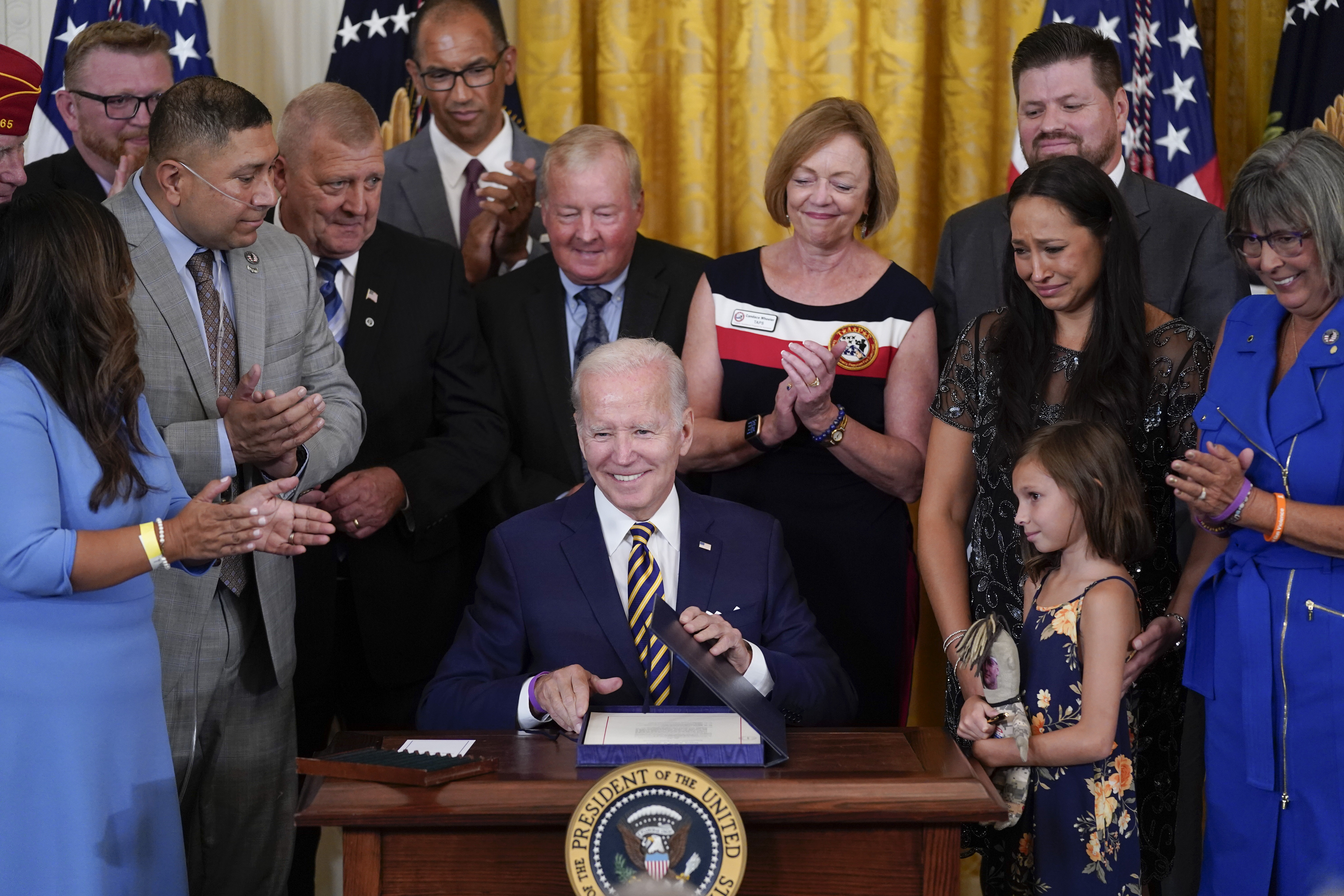
The jury deliberated for less than three hours before returning the verdict.
CONCORD, N.H. — A jury on Tuesday acquitted a commercial truck driver of causing the deaths of seven motorcyclists in a horrific head-on collision in northern New Hampshire that exposed fatal flaws in the processing of license revocations across states. Volodymyr Zhukovskyy, 26, of West Springfield, Massachusetts, was found innocent on seven counts of manslaughter, seven counts of negligent homicide and one count of reckless conduct in connection with the June 21, 2019, crash in Randolph. Jailed since the crash, he appeared to wipe away tears as the verdict was read and briefly raised his index finger skyward before leaving the courtroom. Jurors deliberated for less than three hours after a two-week trial during which prosecutors argued that Zhukovskyy, who had taken heroin, fentanyl and cocaine that day, repeatedly swerved back and forth before the head-on crash and told police he caused it. But a judge dismissed eight charges related to whether he was impaired, and his attorneys blamed the lead biker, Albert “Woody” Mazza, who was among those killed. Thousands of motorcyclists ride in honor of 7 Marine Jarheads bikers killed In closing statements Tuesday morning, the two sides raised questions about who was more “all over the place”: the trucker accused of swerving back and forth across the road or the eyewitnesses accused of contradicting each other. “There is no doubt that this accident was a tragedy,” said defense attorney Jay Duguay said. “But we are not here to decide whether or not this was a tragedy.” Duguay said Mazza was drunk and not looking where he was going when he lost control of his motorcycle and slid in front of Zhukovskyy’s truck. He also accused prosecutors of ignoring that their own accident reconstruction unit contradicted their theory that Zhukovskyy crossed into the oncoming lane. An expert hired by the defense, meanwhile, testified that the crash happened on the center line of the road and would have occurred even if the truck was in the middle of its lane because Mazza’s motorcycle was heading in that direction. “From the beginning of this investigation, the state had made up their mind about what had happened, evidence be damned,” said Duguay, who also highlighted inconsistencies between witness accounts or when witnesses contradicted themselves. “Those witnesses were all over the place about what they recalled and what they claimed to have seen,” he said. In particular, Duguay suggested that members of the Jarheads Motorcycle Club “shaded” their accounts to protect Mazza and the club. Prosecutor Scott Chase acknowledged some inconsistencies, but asked jurors to remember the circumstances. “People were covering the dead, trying to save the barely living, comforting the dying. This wasn’t story time,” he said. “They were up here talking about some of the most unimaginable chaos, trauma, death and carnage that we can even imagine three years later. They were talking about hell broke open.” Witnesses were consistent, he argued, in describing the truck as weaving back and forth before the crash. That behavior continued “until he killed people,” Chase said. “That’s what stopped him. It’s not that he made some responsible decision to start paying attention or do the right thing,” he said. “The only thing that stopped him was an embankment after he tore through a group of motorcycles.” Chase called the attempt to blame Mazza a “fanciful story” and “frivolous distraction,” while reminding jurors that Zhukovskyy, who didn’t testify at trial, told investigators, “Obviously, I caused the crash.” “He was crystal clear from the very beginning that he caused this crash,” Chase said. “That is what he said, because that is what happened.” Zhukovskyy’s commercial driving license should have been revoked in Massachusetts at the time of the crash because of a drunken driving arrest in Connecticut about two months earlier. Connecticut officials alerted the Massachusetts Registry of Motor Vehicles, but Zhukovskyy’s license wasn’t suspended due to a backlog in out-of-state notifications about driving offenses. In a review, federal investigators found similar backlog problems in Rhode Island, New Hampshire and at least six other jurisdictions. The motorcyclists who died were from New Hampshire, Massachusetts and Rhode Island and ranged in age from 42 to 62. They were part of a larger group that had just left a motel along U.S. Route 2 in Randolph. Killed were Mazza, of Lee, New Hampshire; Edward and Jo-Ann Corr, a couple from Lakeville, Massachusetts; Michael Ferazzi, of Contoocook, New Hampshire; Desma Oakes, of Concord, New Hampshire; Daniel Pereira, of Riverside, Rhode Island; and Aaron Perry, of Farmington, New Hampshire. Associated Press Writer Kathy McCormack contributed to this report.
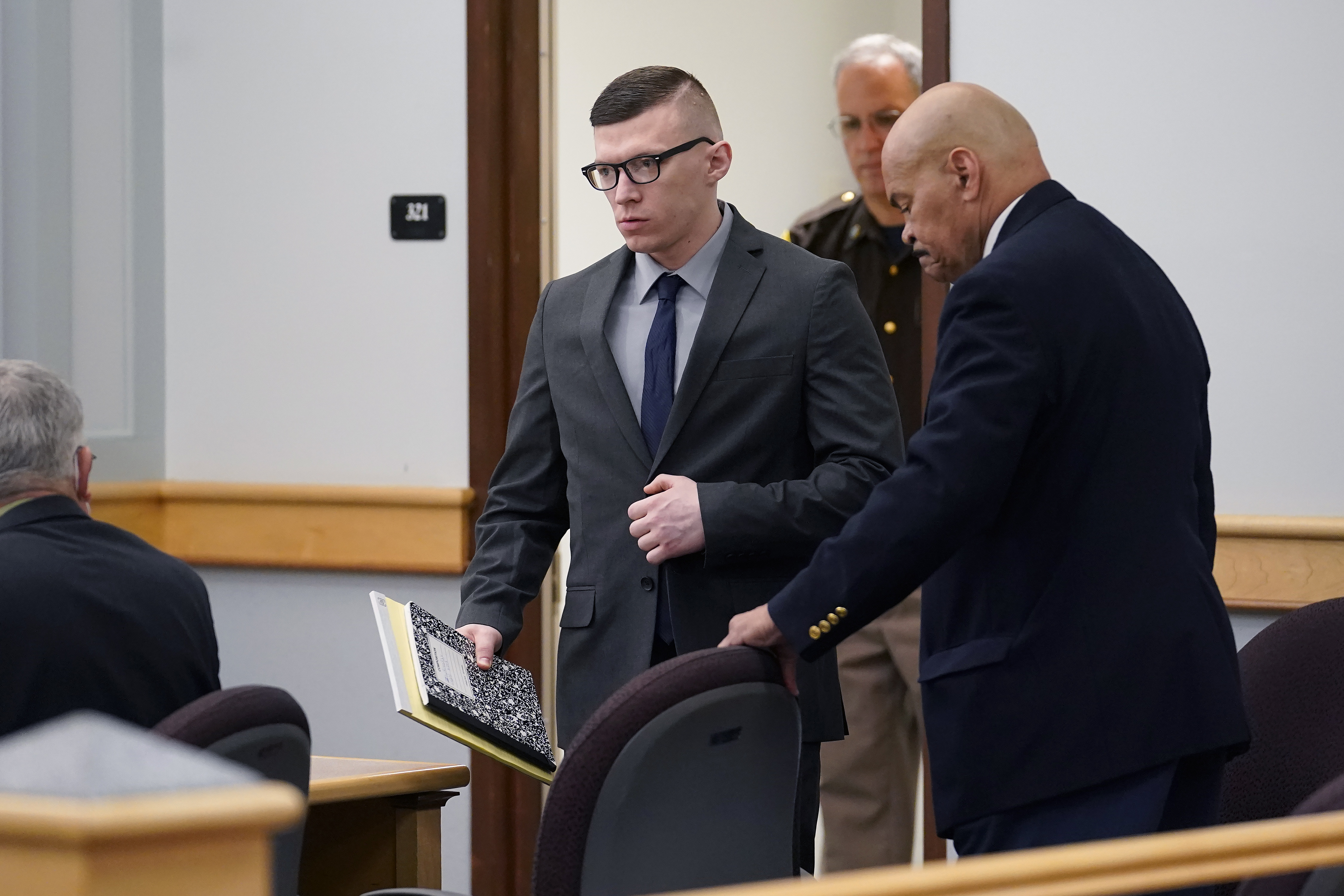
Seven people riding with the Jarheads Motorcycle Club, a motorcycle club that includes Marines and their spouses, were killed in the 2019 crash.
CONCORD, N.H. — A 2019 collision that killed seven members of a Marine motorcycle club would’ve happened even if the truck was in the middle of its lane because the lead biker was “headed in that direction,” a crash reconstruction expert said Monday on the final day of testimony in the truck driver’s trial. Closing arguments are set for Tuesday in the trial of Volodymyr Zhukovskyy, 26, who faces negligent homicide, manslaughter and reckless conduct charges in connection with the June 21, 2019, crash in Randolph, New Hampshire. Prosecutors have argued that Zhukovskyy, who had taken heroin, fentanyl and cocaine that day, repeatedly swerved back and forth before the head-on crash and told police he caused it. But a judge dismissed eight charges related to whether he was impaired, and his attorney blames the lead biker, Albert “Woody” Mazza, saying he lost control of his motorcycle and collided with the truck while driving drunk. Memorial for ‘Fallen 7′ Jarheads Motorcycle Club bikers killed in 2019 crash unveiled Testifying for the defense, William Howerton of Scientific Boston, Inc., was asked where the collision between Mazza’s motorcycle and Zhukovskyy’s truck occurred. “The impact occurred on the double yellow line, directly over,” he said. “The left front wheel of the pickup truck was just a little bit left of center of the double yellow line, still on the yellow line.” Howerton also said that based on his analysis, the truck was aligned with the road while the motorcycle was angled toward the center line just before impact. Asked if the crash would’ve happened had the truck been in the middle of its lane, he said, " If the truck was in the middle of its lane, would the crash still have happened, he said, “Yes. The motorcycle was headed in that direction.” The motorcyclists who died were members of the Jarheads Motorcycle Club from New Hampshire, Massachusetts and Rhode Island and ranged in age from 42 to 62. They were part of a larger group that had just left a motel along the highway and were headed to an American Legion Post in Gorham for a fundraiser. Killed were Mazza, of Lee, New Hampshire; Edward and Jo-Ann Corr, a couple from Lakeville, Massachusetts; Michael Ferazzi, of Contoocook, New Hampshire; Desma Oakes, of Concord, New Hampshire; Daniel Pereira, of Riverside, Rhode Island; and Aaron Perry, of Farmington, New Hampshire. The trial in Coos County Superior Court in Lancaster started July 26.
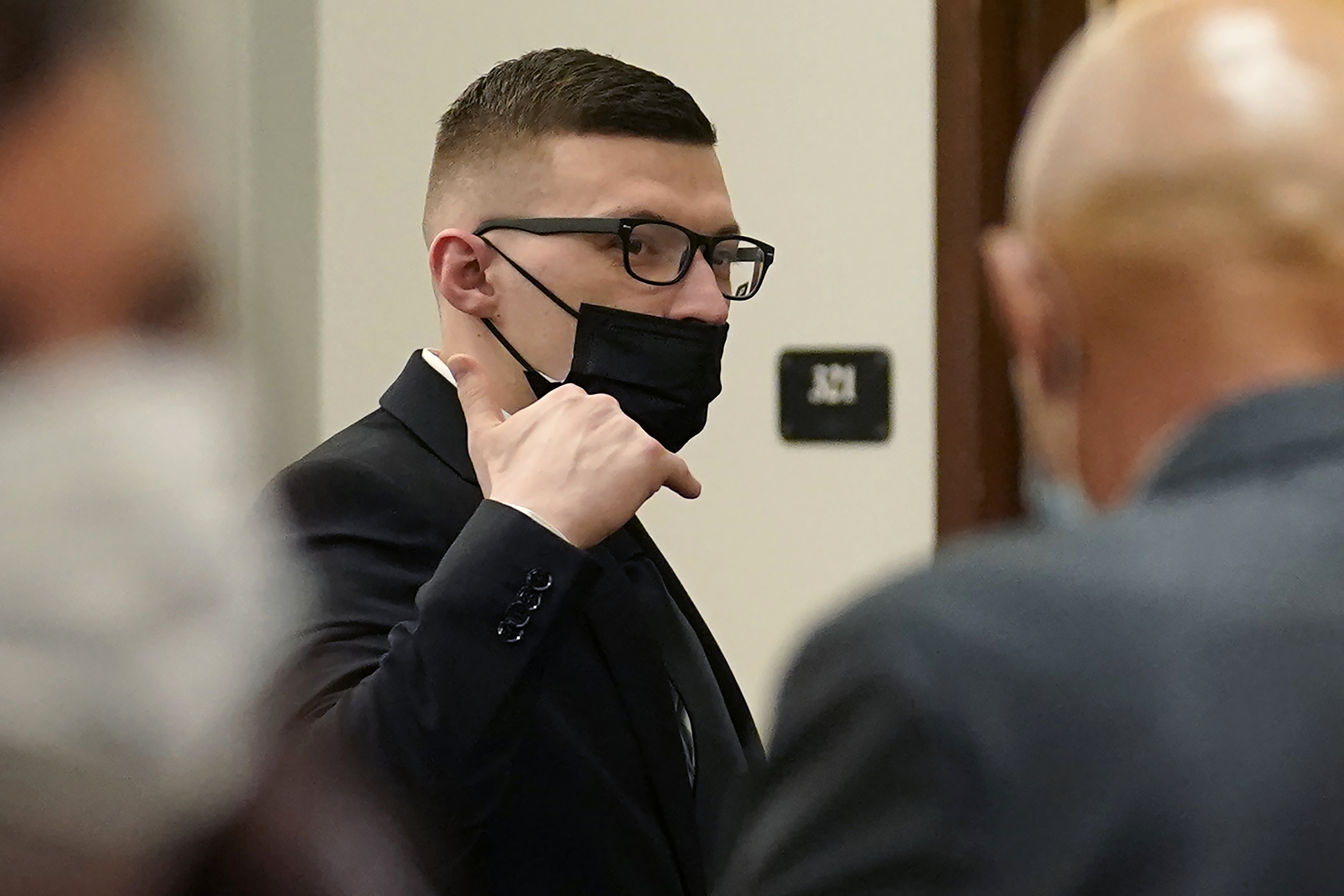
An attorney assisting the veteran hopes the release of the bodycam will push Gastonia police to take accountability for the incident.
Police body camera footage showing the controversial October 2021 arrest of a homeless veteran in Gastonia, N.C., was released July 27, detailing the moments before the veteran was arrested and his service animal tased, ultimately leading to the dog’s death by a car. Joshua Graham Rohrer, a Kentucky Army National Guard veteran who deployed to Kuwait and Iraq between 2004 and 2005, was with his 2-year-old Belgian Malinois service dog Sunshine Rae on Oct. 13 when he was approached by police officers responding to a 911 call regarding his panhandling, which is a crime in North Carolina. What followed next was an arrest that the attorney who helped Rohrer fight for the release of the footage, Andrew LaBreche, called, “far worse than what Mr. Rohrer was able to hear and see on the scene.” “It is rare for a client’s claims that initially appear so sensational to be entirely accurate. After I was finally able to review the body camera footage, however, Mr. Rohrer’s statements were all correct, but what was reflected in recordings were, in fact, far worse than what Mr. Rohrer was able to hear and see on the scene,” LaBreche said in an email to Military Times. LaBreche also stated that he believes the video proves responding officers were not truthful regarding their handling of Rohrer’s arrest, and hopes that the release of the bodycam footage will force the Gastonia Police Department to take accountability for the incident. While there is a North Carolina statute that affords people with disabilities the right to keep their service dogs with them in all public and government spaces where the public are allowed to go, Rohrer said he was denied this option. Sunshine was hit and killed by a car while Rohrer waited for release in jail, a situation Rohrer said never should have happened. In the bodycam footage, shown from both the vantage points of responding Officers Maurice Taylor III and Cierra Brooks, Rohrer and Sunshine can be seen on the median of a busy street in downtown Gastonia. After a few minutes of arguing between Rohrer and law enforcement about Rohrer’s activities, Rohrer is grabbed and told by the officers that he will be arrested after not presenting his state ID. Over the course of the argument, Sunshine can be seen sitting, laying and standing next to her owner. During the arrest, Rohrer is pushed up against the hood of the car and calls out, “what are you doing?” in a panicked voice. Officer Taylor is then heard on video saying that the dog bit him, though the dog is outside the footage’s frame of view. In the following moments, Rohrer is thrown to the ground while Sunshine jumps on the hood of the police car, wagging her tail. Taylor then tased the dog in the back after she tried to get closer to Rohrer on the ground. The footage then showed Rohrer distraught on the ground and calling out for help. Bystanders then approached the police officers, the footage shows, saying that Rohrer has “been out here for months, [and] his dog has never attacked anybody.” The remainder of the footage shows other officers arriving and discussing the situation while Rohrer repeatedly asks for his dog. Officer Taylor claims that the dog looked like it was going to bite his partner, so he “did the logical thing” and used his taser. Days prior to the release of the footage, panhandling and resisting arrest charges against Rohrer were dropped. Rohrer pleaded guilty to a separate charge from an unrelated event involving driving without a license. “The release of the body camera footage involving myself and Sunshine, has been a long arduous journey,” Rohrer said in a statement to Military Times. “The release of the video is as traumatic as the event itself. I hope now that it has been released I can begin to grieve my friend, my confidant, my world. I thank those who have believed in me and supported me for the past nine months.” Rohrer said the video shows Sunshine “just doing her job.” “Sunshine was not acting erratically, in fact she performed 3 separate trained tasks in the video,” Rohrer said. “Her attempt to get to my face to perform grounding techniques, her attempt to become a passive barrier between myself and Officer Brooks; and passively blocking between myself and Officer Taylor.” Rohrer hopes the incident will ultimately have a positive impact on veteran and homeless communities. “I hope to continue to fight for better crisis intervention training, protections for service animals and their handlers, and justice for what was done to Sunshine,” he said. “In addition, this case highlights the need for reform of North Carolina’s Body Camera Laws. No citizen should have to fight so hard and for so long as we have for the truth.” The Gastonia Police Department did not respond to request for comment by the time of publication.

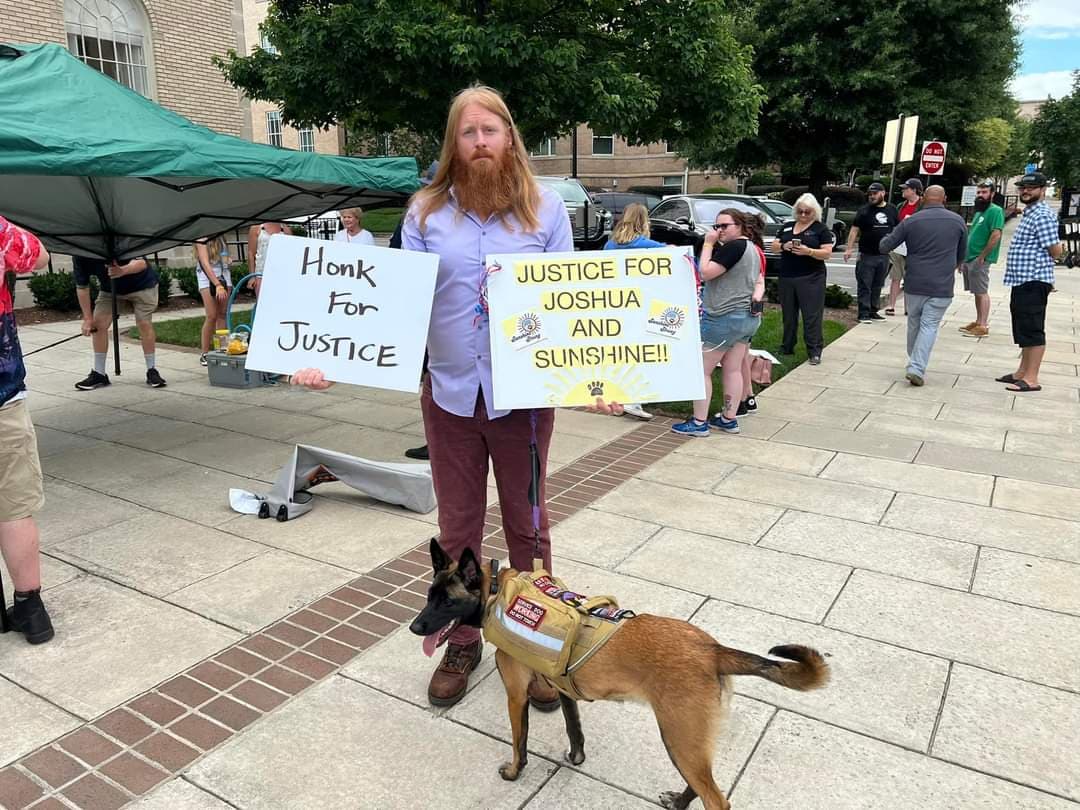
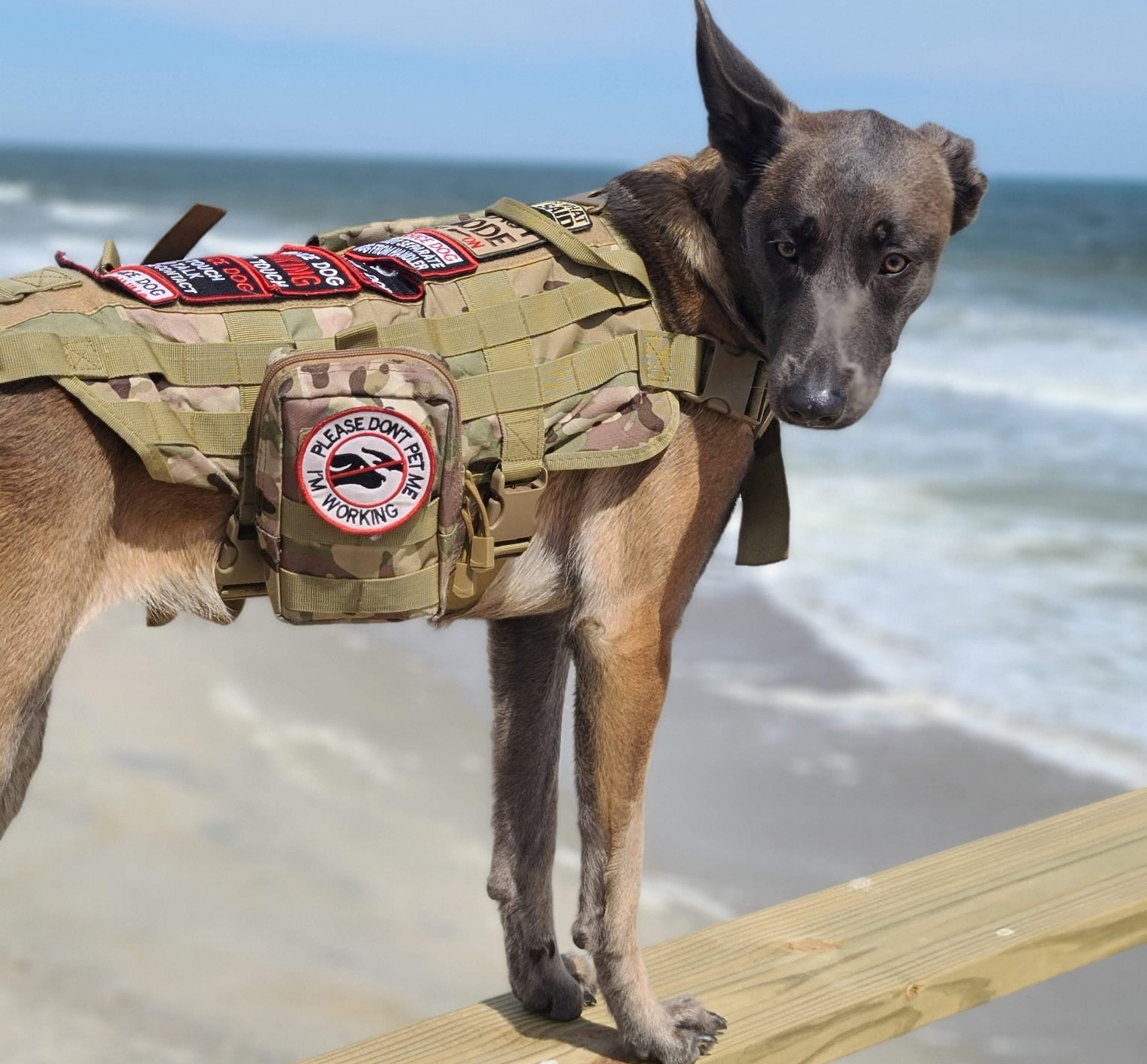
Volodymyr Zhukovskyy faces negligent homicide and other charges in connection with the June 2019 crash in Randolph, New Hampshire.
A survivor of a crash that killed seven fellow members of a Marine motorcycle club acknowledged Wednesday that the lead rider had an unsafe blood alcohol level but denied that the club president swerved into the path of the oncoming truck. Josh Morin was the final witness for the prosecution, which has rested in the trial of Volodymyr Zhukovskyy, the truck driver charged in connection with the June 21, 2019, crash in Randolph, New Hampshire. A judge dismissed eight charges Wednesday related to whether Zhukovskyy was under the influence of drugs or alcohol at the time of the crash, but ruled there was sufficient evidence to support the 15 more serious charges of negligent homicide, manslaughter and reckless conduct. Prosecutors have argued that Zhukovskyy, 26, who had taken heroin, fentanyl and cocaine that day, repeatedly swerved back and forth before the head-on crash and told police he caused it. But his attorney blames the lead biker, saying he lost control of his motorcycle and collided with the truck while driving drunk. Albert “Woody” Mazza, president of the Jarheads Motorcycle Club, had a blood alcohol level well above New Hampshire’s legal limit of 0.08%, said defense attorney Steve Mirkin. Memorial for ‘Fallen 7′ Jarheads Motorcycle Club bikers killed in 2019 crash unveiled “What part of safety was being at the front of the line of motorcycles with a blood alcohol concentration of .135?” he asked Morin. “Would you agree with me that’s not consistent with safe driving?” Morin, a registered nurse, agreed but said Mazza did not appear impaired. And he insisted that Mazza stayed in his lane and that it was Zhukovskyy who crossed the line and caused the crash. “He veered into our lane and hit Al,” Morin said. “We were close to the center line, so it wouldn’t have been all the way in our lane, but in our lane.” Mazza and the six other motorcyclists who died were from New Hampshire, Massachusetts and Rhode Island and ranged in age from 42 to 62. They were part of a larger group that had just left a motel along the highway and were headed to an American Legion Post for a fundraiser. Morin, who was riding directly behind Mazza, suffered a severe leg injury and has undergone 25 surgeries since the crash. He said he remembered asking for his wife at the crash site as he bled, but in retrospect, is glad she wasn’t there. “I think if I would have seen her, I would have said goodbye and died,” he said.

A forensic toxicologist testified that a substance made when the body breaks down heroin was present in Volodymyr Zhukovskyy’s blood just hours after the crash.
CONCORD, N.H. — A substance made when the body breaks down heroin was present a truck driver’s blood just hours after he was involved in a 2019 crash that killed seven motorcyclists, a forensic toxicologist testified Monday. The metabolite, referred to as “6-MAM,” is unique to heroin and was found in the driver’s blood below “below the reporting limit,” the concentration of substances that can be measured accurately, said Donna Papsun of Pennsylvania-based NMS Labs. She had been asked to do additional testing by the New Hampshire State Police Forensic Laboratory. Papsun’s testimony in the trial of Volodymyr Zhukovskyy expanded on what the National Transportation Safety Board says the driver told police about his drug use on the day of the crash. Thousands of motorcyclists ride in honor of 7 Marine Jarheads bikers killed Zhukovskyy’s lawyer, Steve Mirkin, has said his client did take heroin, fentanyl and cocaine on June 21, 2019, but said there’s no evidence he was impaired at the time of the crash and that police did not make any observations in the hours afterward suggesting that he was impaired. Papsun was questioned in superior court in Lancaster, New Hampshire, by lawyers from both sides about how long heroin stays in the system, as well as other drugs that showed up in Zhukovskyy’s bloodwork, such as fentanyl, morphine and a metabolite found after cocaine consumption, and how those drugs could affect a person. Prosecutors said Zhukovskyy, 26, of West Springfield, Massachusetts, was impaired and “weaved back and forth repeatedly” before the head-on crash on U.S. Route 2 in Randolph. Zhukovskyý's lawyers have said the lead motorcyclist, who died, was drunk and caused the crash. His blood-alcohol level registered at nearly twice the legal limit of .08 in New Hampshire. Papsun testified that “6-MAM” breaks down fast and has a half-life — the time it takes in the body to reduce it by half — ranging from about five to six minutes to about 25 to 30 minutes. She said it could take up to 3 1/2 hours for the body to clear its original dose, but it could take less than time than that for some people, “depending on an individual’s ability to break that down.” Zhukovskyy’s first blood sample was taken shortly after 8:30 p.m., about two hours after the collision. She said the second blood sample, taken about an hour later, did not show a reliable reading of “6-MAM.” Defense attorney Jay Duguay asked Papsun if just the presence of the substances alone in a person’s blood means that they are impaired. “You can’t make that determination based on the toxicology alone?” he said. “No,” she answered. The motorcyclists who died were part of Jarheads Motorcycle Club, for Marines and their spouses. They were from New Hampshire, Massachusetts and Rhode Island and ranged in age from 42 to 62. They were part of a larger group that had just left a motel along the highway and were headed to an American Legion Post in Gorham for a fundraiser. They were traveling east when the collision with the westbound truck occurred.
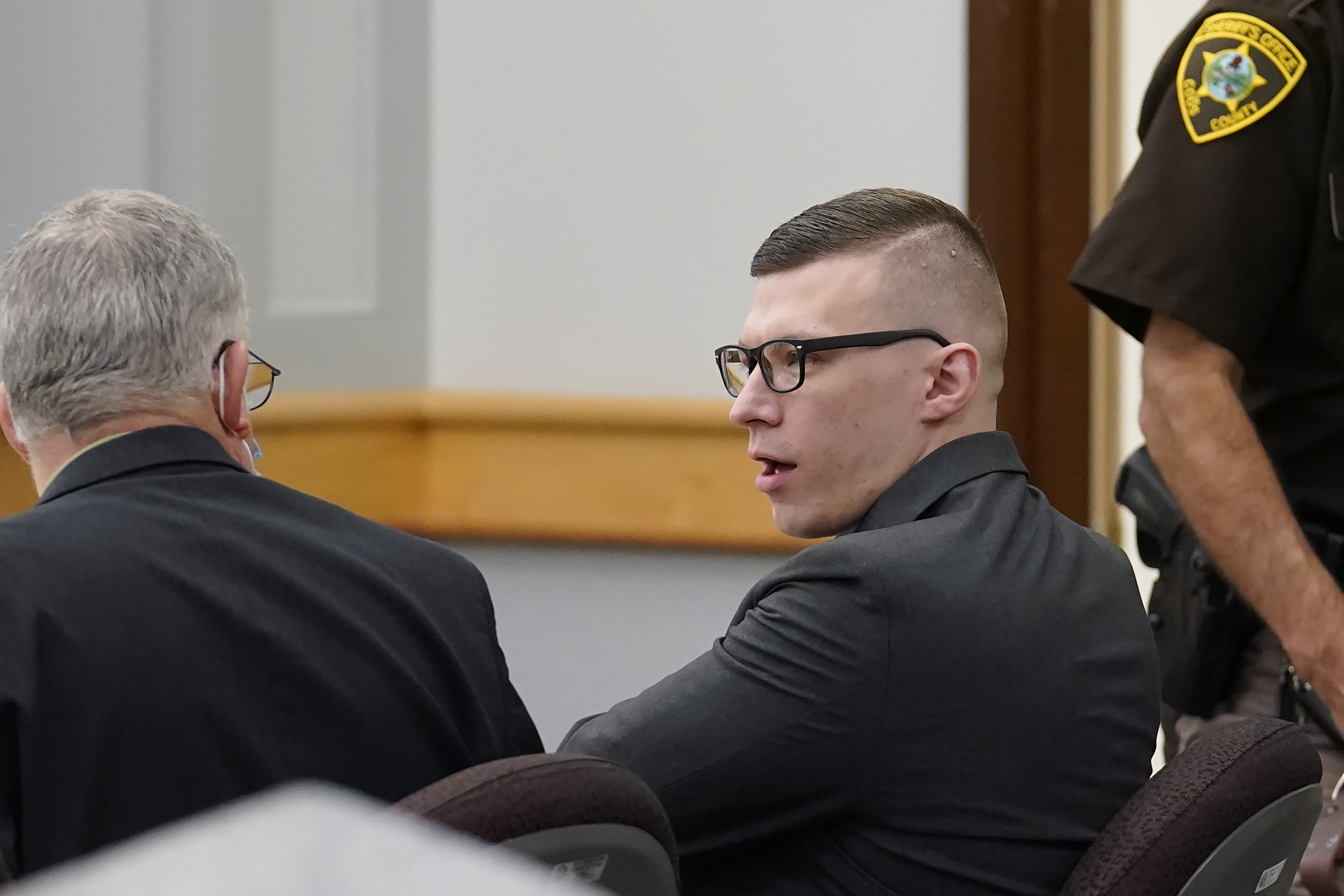
Seven people riding with the Jarheads Motorcycle Club in remote northern New Hampshire were killed in the 2019 crash.
CONCORD, N.H. — The last rider in a group of Marine motorcycle club members testified July 27 that he saw a “ball of flame” and then a truck “plowing through motorcycles like a bowling ball” in a 2019 crash in New Hampshire that killed seven bikers. Michael McEachern testified in the trial of the truck driver, Volodymyr Zhukovskyy. He said he saw the westbound truck, which was pulling a flatbed trailer, hit some of the eastbound riders shortly after the group left a motel to head to an American Legion post for a meeting that June 21. He said he tried to help them, but he saw that some had died, including a husband and wife found underneath the truck’s front bumper. “After I saw that I couldn’t do anything for them, I covered them up,” he said. Memorial for ‘Fallen 7′ Jarheads Motorcycle Club bikers killed in 2019 crash unveiled Another rider who died was thrown off a bike and found in the woods, he said. One was slumped over bushes. Another was pinned under the trailer. McEachern saw that the truck was on fire. He ran into the driver. “He just jumped out of the truck, started screaming, ‘What did I do, What did I do? Mommy, Mommy! Oh my God, Oh my God!’” McEachern testified in state superior court in Lancaster. He said he tried to keep Zhukovskyy away from the burning truck, but that Zhukovskyy made trips back to the vehicle to retrieve items. McEachern said he asked Zhukovskyy what had happened. “He mentioned he lost control of the trailer,” he said. Zhukovskyy, 26, of West Springfield, Massachusetts, has pleaded not guilty to multiple counts of negligent homicide, manslaughter, driving under the influence and reckless conduct. He’s been in jail since the crash. Prosecutors said Zhukovskyy had taken drugs that day and was driving recklessly. But his lawyers said he was not impaired at the time. They said the president of the Jarheads Motorcycle Club, Albert “Woody” Mazza, who led the pack of riders, was drunk, lost control of his motorcycle, and came into contact with Zhukovskyy’s truck first, causing the crash. Mazza died. Two riders traveling closer to Mazza testified that part of the truck had crossed the yellow line, and then hit Mazza. “His bike went flying backwards,” said Valerie Ribeiro, who was a passenger on her husband’s motorcycle. “Just like a toy flying through the air. “Everything was on fire. It was motorcycle parts everywhere. It was like a bomb had gone off,” she testified. She said Wednesday the “front quarter” of the truck was over the line. But defense attorney Steve Mirkin said Ribeiro did not mention that in her initial statement to police the day after the crash. Another rider who also was traveling near Mazza testified that the truck’s left front tire was over the line, possibly by as much as a foot, before the truck hit Mazza’s motorcycle. However, Mirkin pointed out the rider told police a few days after the crash that the tire was on top of the yellow line, “or even more so.” Other motorcyclists who were in the back of the group testified Wednesday that they saw Mazza drinking beer earlier that day, but that they did not see any signs that he was impaired. The motorcyclists who died were from New Hampshire, Massachusetts and Rhode Island and ranged in age from 42 to 62. They were part of a larger group that had just left a motel along U.S. Route 2 in Randolph. Killed were Mazza, of Lee, New Hampshire; Edward and Jo-Ann Corr, a couple from Lakeville, Massachusetts; Michael Ferazzi, of Contoocook, New Hampshire; Desma Oakes, of Concord, New Hampshire; Daniel Pereira, of Riverside, Rhode Island; and Aaron Perry, of Farmington, New Hampshire. Several bikers were also injured.
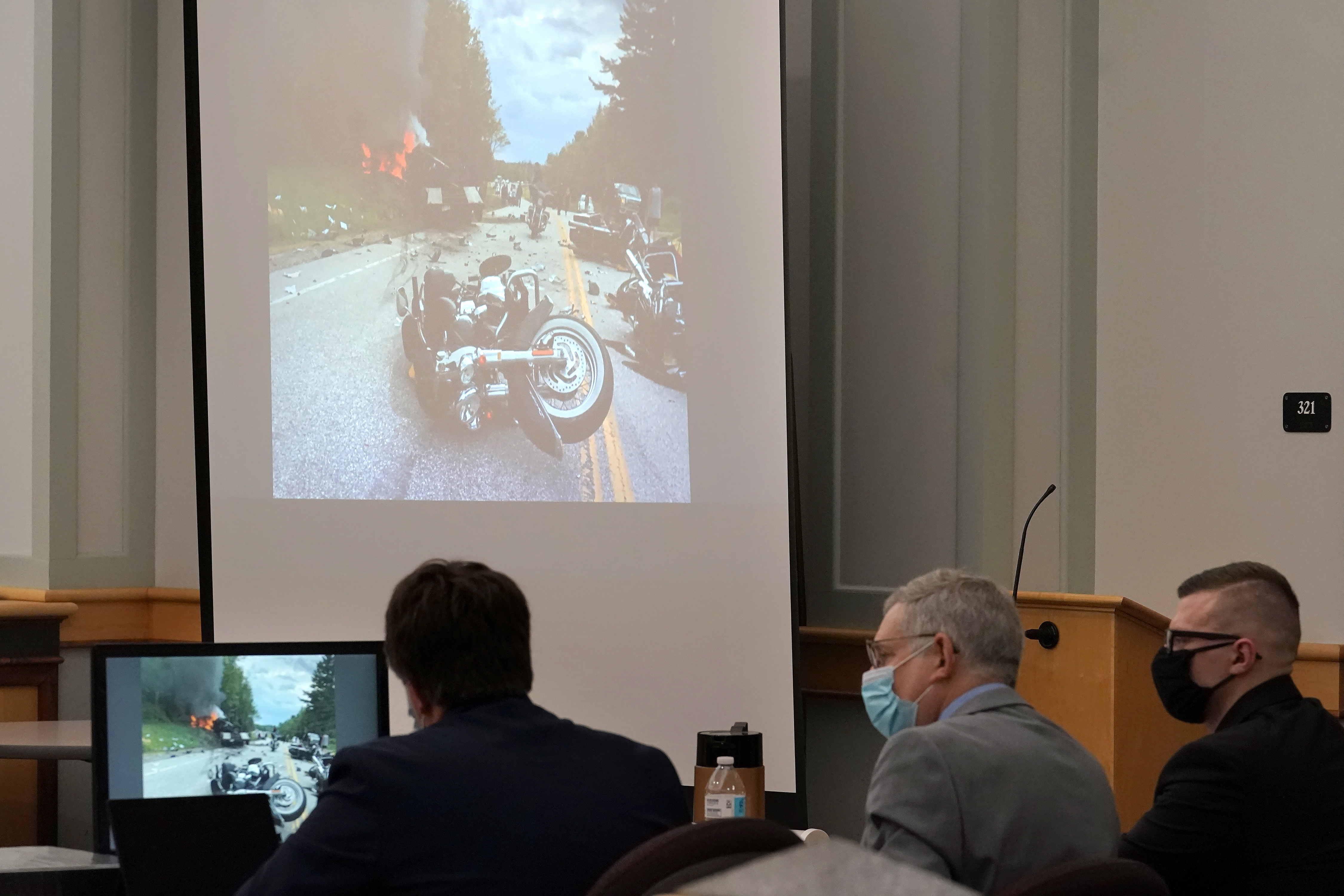
Army Pfc. David Owens will be buried at Arlington National Cemetery at a date to be determined, according to the Defense POW/MIA Accounting Agency.
GREEN HILL, N.C. — DNA, dental and other analyses have confirmed the identity of remains buried in Belgium as a 27-year-old World War II soldier from North Carolina who died during battle in a German forest. The Charlotte Observer reports that officials with the Defense POW/MIA Accounting Agency said in a news release Friday that Army Pfc. David Owens, of Green Hill in Watauga County, died while his unit battled German forces in a forest near Hürtgen, Germany. Owens was among the first soldiers to land on the French coast on D-Day, June 6, 1944, when Allied troops invaded Nazi-occupied France, according to newspaper clippings when Owens was reported missing in action on Nov. 22, 1944. Owens was assigned to Company E, 2nd Battalion, 12th Infantry Regiment, 4th Infantry Division, DPAA officials said. Thanks to a DPAA historian, remains believed to be Owens were disinterred in August 2018 from Ardennes American Cemetery, an American Battle Monuments Commission site in Neuville-en-Condroz, Belgium, officials said. Agency investigators sent the remains to a DPAA lab at Offutt Air Force Base, Nebraska. DPAA scientists at the military base identified Owens through “dental and anthropological analysis, as well as circumstantial evidence,” according to the news release. Owens’ family couldn’t immediately be reached by the newspaper. Owens will be buried at Arlington National Cemetery at a date to be determined, DPAA officials said.
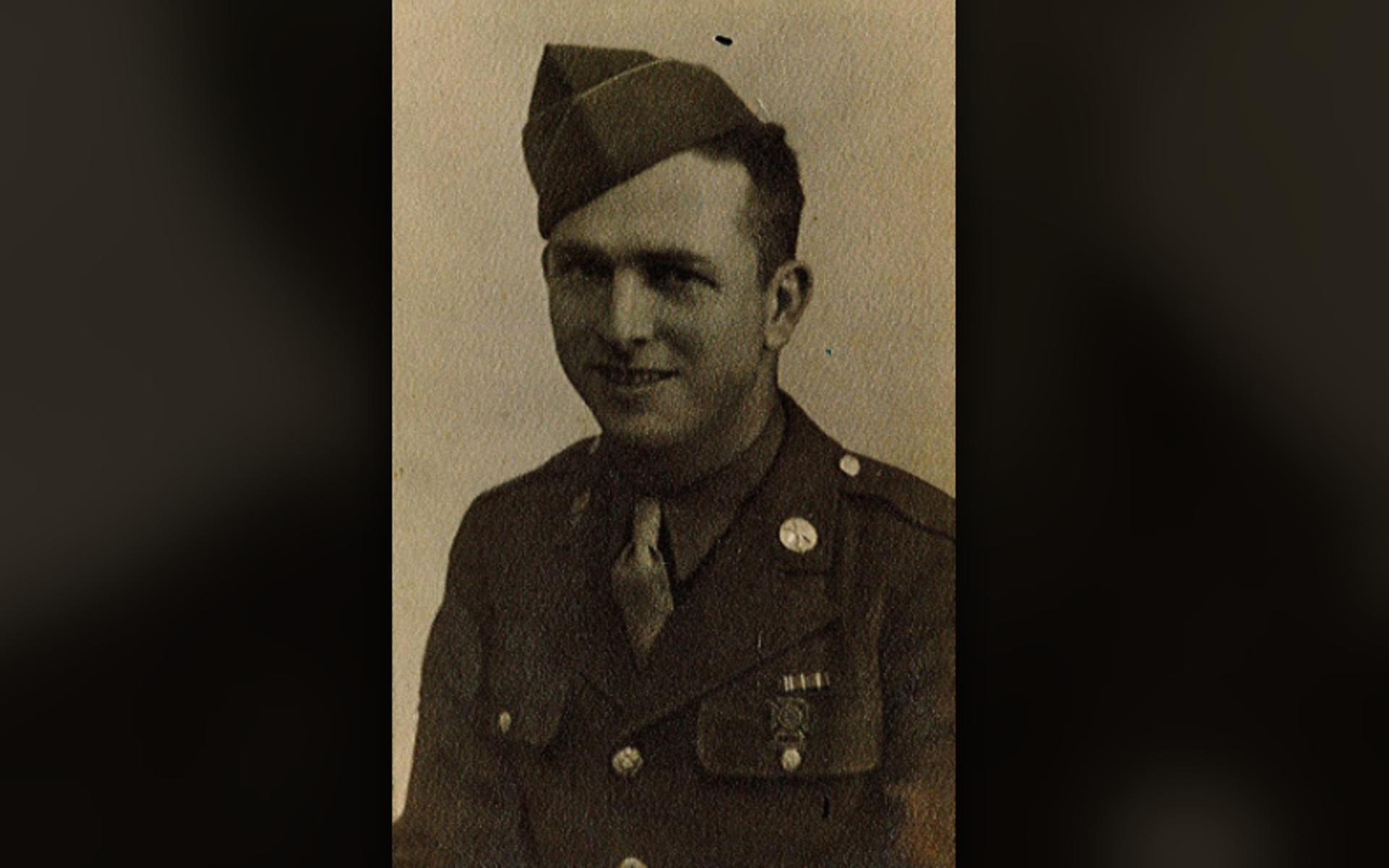
The news represents the best streak of veterans employment data in 22 years.
The veterans unemployment rate settled at 2.7% for the third consecutive month in July, extending positive news about the veterans job market to its best streak in 22 years, according to the federal researchers. In its monthly employment estimates released Friday, officials from the Bureau of Labor Statistics said about 237,000 veterans were unable to find work last month. That’s roughly the same level as May and June, and down from around 350,000 one year ago. July was the fifth consecutive month that the veterans unemployment level was under 3%, the longest such streak since at least the start of 2000. (Public BLS data on veterans only extends back to that mark). From March to November 2000, the rate was below 3.0% eight out of nine consecutive months. Unemployed veterans dropped by more than half-a-million in last two years The positive news for veterans comes amid improvement in the overall American job market as well. The national unemployment rate fell from 3.6% in June to 3.5% in July as the economy added about 528,000 jobs last month. In a statement, President Joe Biden hailed the jobs news as evidence the country is recovering from the still ongoing coronavirus pandemic. The national unemployment rate spiked to more than 14 percent in spring 2020 as companies were forced to shut down operations in an attempt to stop the virus’ spread. “More people are working than at any point in American history,” Biden said. “That’s millions of families with the dignity and peace of mind that a paycheck provides … There’s more work to do, but today’s jobs report shows we are making significant progress for working families.” Officials from the Republican National Committee noted that the positive unemployment numbers do not address rising inflation across the country, which they say presents a bigger challenge to American families. Veterans unemployment rate under 3% for nearly all eras of service The unemployment rate for veterans of the Iraq and Afghanistan war era rose from 2.9% in June to 3.4% in July. However, researchers have warned that smaller sampling sizes in the BLS research can lead to dramatic month-to-month swings in those figures. The number of young veterans out of work has remained around 130,000 since early 2021, according to the bureau’s estimates. About 8.5 million veterans are in the U.S. workforce today. That’s about 45% of the nation’s veterans population. Individuals who have retired or are unable to work because of service injuries are not included in the monthly unemployment calculations.

Some portions of the sweeping veterans policy measure will go into effect as soon as it becomes law. Others will take years.
Just moments after the Senate finalized a military toxic exposure bill that could benefit millions of veterans, activist John Feal issued a warning to the crowd of advocates celebrating outside the Capitol about the moment they had been lobbying for and dreaming about for years: “The hard part hasn’t begun.” Feal — who spent years as one of the lead advocates to award federal benefits to Sept. 11 victims, first responders and their families — said work to make sure those payouts and resources are properly funded and administered continues to this day. He cautioned that even well-written bills don’t always mean an easy transition to getting people the help they need. “Getting a bill passed is easy, you just have to beat up the Senate and the House,” Feal said. “These people behind me, they have to take that and make sure Congress and the VA now do the right thing.” Millions of vets suffering from burn pit, toxic injuries set for more benefits after Congress passes PACT Act The Promise to Address Comprehensive Toxics Act — better known as the PACT Act — is set to be signed into law by President Joe Biden on Aug. 8. When that happens, it will mark a key moment in the 13-year-old fight to expand benefits for burn pit victims sickened in Iraq and Afghanistan, and the decades-old quest to fully compensate Vietnam veterans for their exposure to chemical defoliants. But, advocates say it won’t be the end of their work on the issue. The next step is delivering the benefits to veterans and their families, estimated to cost around $300 billion over the next 10 years. White House and Veterans Affairs officials promise they have been preparing for that task for months. “Veterans who were exposed to toxic fumes while fighting for our country are American heroes, and they deserve world-class care and benefits for their selfless service,” VA Secretary Denis McDonough said in a statement minutes after Feal’s speech. “Once the president signs this bill into law, we at VA will implement it quickly and effectively, delivering the care these veterans need and the benefits they deserve.” When will benefits arrive Separate from the congressional work, VA last year began revamping how it approaches illnesses believed linked to burn pit smoke in places like Iraq and Afghanistan. In the past, the department stuck to strict scientific evidence before granting presumptive status for illnesses believed linked to military service. Now, the department uses a wider set of metrics to evaluate the claims, which has led to adding 12 respiratory illnesses and cancers to the list of conditions presumed caused by burn pits (a designation that greatly speeds up the process of veterans receiving disability payouts). Once the PACT Act is signed into law, those new processes will be codified, a move that veterans advocates say will be key in coming years to preventing long waits for department recognition of military injuries. Other parts of the sweeping toxic exposure legislation will also go into effect immediately. Veterans currently get five years of medical coverage through VA after leaving the service, but will see that expanded to 10 years under the new law. Here are the veterans who will benefit from Congress’ sweeping toxic exposure bill All veterans who left the ranks in summer 2017 or later will have their eligibility automatically extended. Veterans who left between summer 2014 and summer 2017 will be able to apply for additional years of health care coverage, ending at 10 years after the date they separated. The benefits for individual illnesses will take longer to process. The law calls for VA to add 23 new conditions to the list of burn pit presumptive illnesses — including asthma, chronic bronchitis and brain cancer — but those will be phased in over the next three years. For Vietnam veterans exposed to Agent Orange, presumptive status for monoclonal gammopathy of undetermined significance (MGUS) goes into effect immediately. But new benefits for Vietnam veterans suffering from high-blood pressure (a group estimated to be around 500,000 individuals) aren’t set to go into effect until late 2026. There are provisions in the bill to speed up benefits for individuals with deteriorating health conditions, or age 80 and older. However, as the bill is written, some veterans expecting to benefit from the PACT Act won’t see any checks in the mail for another four years. Changing the timeline White House officials said they are hoping to speed that up. “The law does provide discretion to the VA secretary to move more quickly than some of the dates, so we’re going to be working collaboratively to see how much we can get done as quickly as possible so that veterans can get the services they need,” said Terri Tanielian, special assistant to the president for Veterans Affairs. “The department is focused on making sure that they can hire the staff that they need, that they have the resources in the right places. We’re mindful of needing to make sure that the workforce and the infrastructure is ready.” Lawmakers included funding in the measure for the new hires, aware that sending millions of new benefits claims to VA in coming years has the potential to overwhelm their current systems. Burn pits benefits bill concerns aren’t new, hinge on budget moves Biden called on Congress to pass comprehensive burn pit legislation in his State of the Union speech last spring. Tanielian said now that it has been done, the administration is focused on making sure it meets its responsibilities to implement the measure. “This is a major victory for veterans, their families and survivors and those that have cared for them over the years,” she said. “We’re looking forward to the President signing it and then being able to implement it effectively so that we can deliver the health care benefits that we know veterans have earned and that they deserve.” Veterans advocates said they’ll be lobbying for quicker responses, too. The provisions regarding deteriorating health conditions are written broadly, and some veterans groups said they see opportunities to force VA to respond immediately to certain claims even if the law seems to give them more time. But much of that will depend on VA’s ability to hire new staff to process claims and respond to veterans’ questions. The department has hired several hundred claims processors in recent months to deal with the glut of overdue disability claims (cases pending for more than four months). The figure was as high as 264,000 last fall, but now sits at about 165,000, roughly half what it was before the coronavirus pandemic. What are military burn pits? And why are veterans worried about them? Apply now The Department of Defense has estimated nearly 3.5 million troops from recent wars may have suffered enough exposure to the smoke to cause health problems. Only a small portion of that group has signed up for VA’s official burn pit registry, designed to help track health issues in that population. In his statement on the PACT Act passage, McDonough encouraged eligible veterans to apply for benefits as soon as possible, rather than waiting on the legislation’s official start date. Depending on the case, veterans may eventually be eligible for retroactive pay if they file earlier. Veterans can visit the department’s online page regarding PACT information or call 1-800-MyVA411 (800-698-2411). “The PACT Act is perhaps the largest health care and benefit expansion in VA history,” the VA’s benefits site states. “If you’re a veteran or survivor, you can file claims now to apply for PACT Act-related benefits.” In his statement, McDonough said that department officials “will be communicating with you every step of the way to make sure that you and your loved ones get the benefits you’ve earned.” As Feal delivered his speech to the celebrating advocates, Senate Veterans’ Affairs Committee Chairman Jon Tester, D-Mont., received a text from McDonough offering his congratulations on the legislative victory and promising that “we will execute this.” Tester said he’ll hold the secretary to that promise. “We’ll be watching,” he said. “I know they’re committed, and I know the president said we’re going to get this done. But we’ve got to watch them to make sure.”
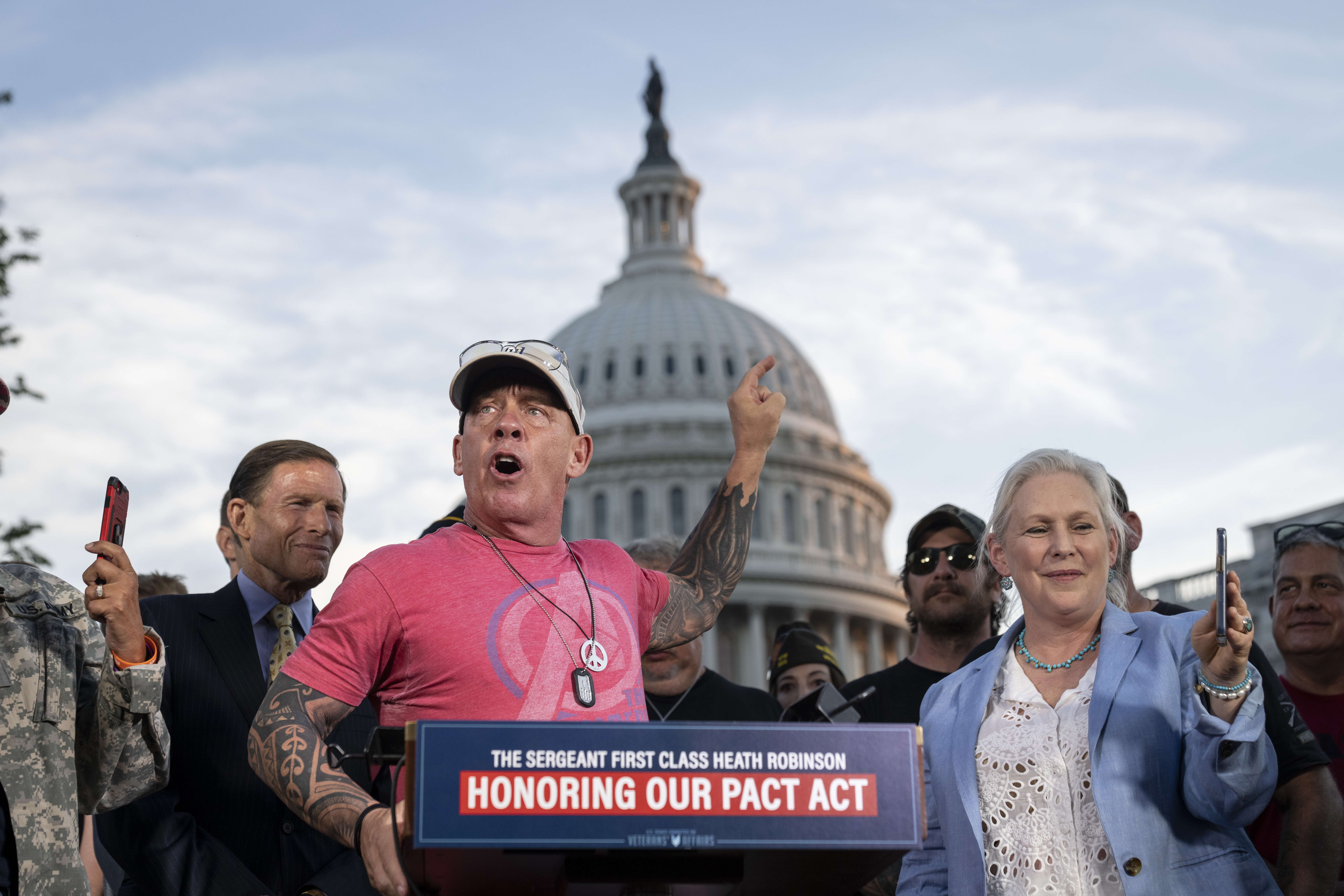
The fires used in combat zones to dispose of waste may have caused serious illnesses in hundreds of thousands of U.S. service members.
Burn pits are well-known within the military community, but the reasons for using them and the dangers that accompany them are less familiar to the American public. With the topic gaining prominence in recent months, here’s a look at the issues surrounding burn pits and the help veterans could receive in dealing with their effects. What are burn pits? Until the mid-2010s, burn pits were commonly used in Iraq, Afghanistan and other overseas locations to dispose of waste collected on military bases. That included items that produced dangerous toxic smoke when burned, such as plastics, rubber, chemical mixtures and medical waste. In some locations, the fires were massive operations. At Joint Base Balad — one of the largest military bases in Iraq — the burn pit covered nearly 10 acres, with the resulting smoke passing over the entire base as winds shifted. Military Times' coverage of burn pits In 2008, Military Times began reporting about service members returning from war zones with unusual respiratory illnesses they believed were linked to the toxic fumes. Since then, numerous studies and reports have suggested links between the poor air quality and rare cancers found in increasing numbers among post-9/11 veterans. The Department of Defense has estimated nearly 3.5 million troops from recent wars may have suffered enough exposure to the smoke to cause health problems. Why is there a fight over disability pay related to burn pits? Because the Defense Department did not keep clear records of what was burned in the waste pits, the exact toxins in the smoke are unknown. And while the pits were widely used, individual service members were not monitored for their exposure to the smoke, making it unclear if later illnesses were connected to that or to other life events. As a result, the Department of Veterans Affairs has for years resisted calls to link many rare illnesses to suspected burn pit exposure, saying that the scientific backing for the argument is too weak. Advocates say that has deprived tens of thousands of veterans of disability pay and medical reimbursements. VA officials have relented in that stance in the last year, awarding presumptive benefits status (where veterans don’t have to prove their medical conditions are linked to their time in the military) to any post-9/11 veteran who contracts asthma, rhinitis and sinusitis within 10 years of of their overseas service. But advocates say that should go much further, to include many more illnesses and extending for longer after their overseas tours ended. Does the US still use burn pits? The Department of Defense has not formally banned burn pits. However, troops have scaled back the use of burn pits. While burn pits are considered something of a last resort, according to Defense Department policy, at least nine of them were still in operation in early 2019, per an a report to Congress in April of that year to Congress from the under secretary of defense for acquisition and sustainment. In the report, the Pentagon acknowledged that burning hazardous waste, tires and plastic in open pits creates dangerous fumes, but it was still done during deployments if the local combatant commander can’t find a suitable alternative. From 2008: Troops say chemicals and medical waste burned at Balad are making them sick What has changed recently? Veterans groups have been working to highlight the issue of burn pit injuries for more than a decade, but the subject has gained widespread public awareness after President Joe Biden included the topic in his State of the Union address on March 1. Biden has discussed the issue in the past, but including new benefits and research into the topic as a priority in the annual address puts focus on the issue on a higher level than ever before. Biden calls caring for burn pit illnesses a ‘sacred obligation’ The president’s personal connection to the problem has also played a part. Biden’s son Beau served in Iraq with the Delaware Army National Guard and died in 2015 from a rare brain cancer. Biden has said he doesn’t know if burn pits caused his son’s cancer, but he suspects there was a link. The story also gained attention from national news outlets and programs such as “The Problem With Jon Stewart. On Aug. 2, Congress finalized the Promise to Address Comprehensive Toxics Act, which would extend new health care access and disability benefits to about 3.5 million veterans, including burn pit victims. President Joe Biden is expected to sign the measure into law on Aug. 8.
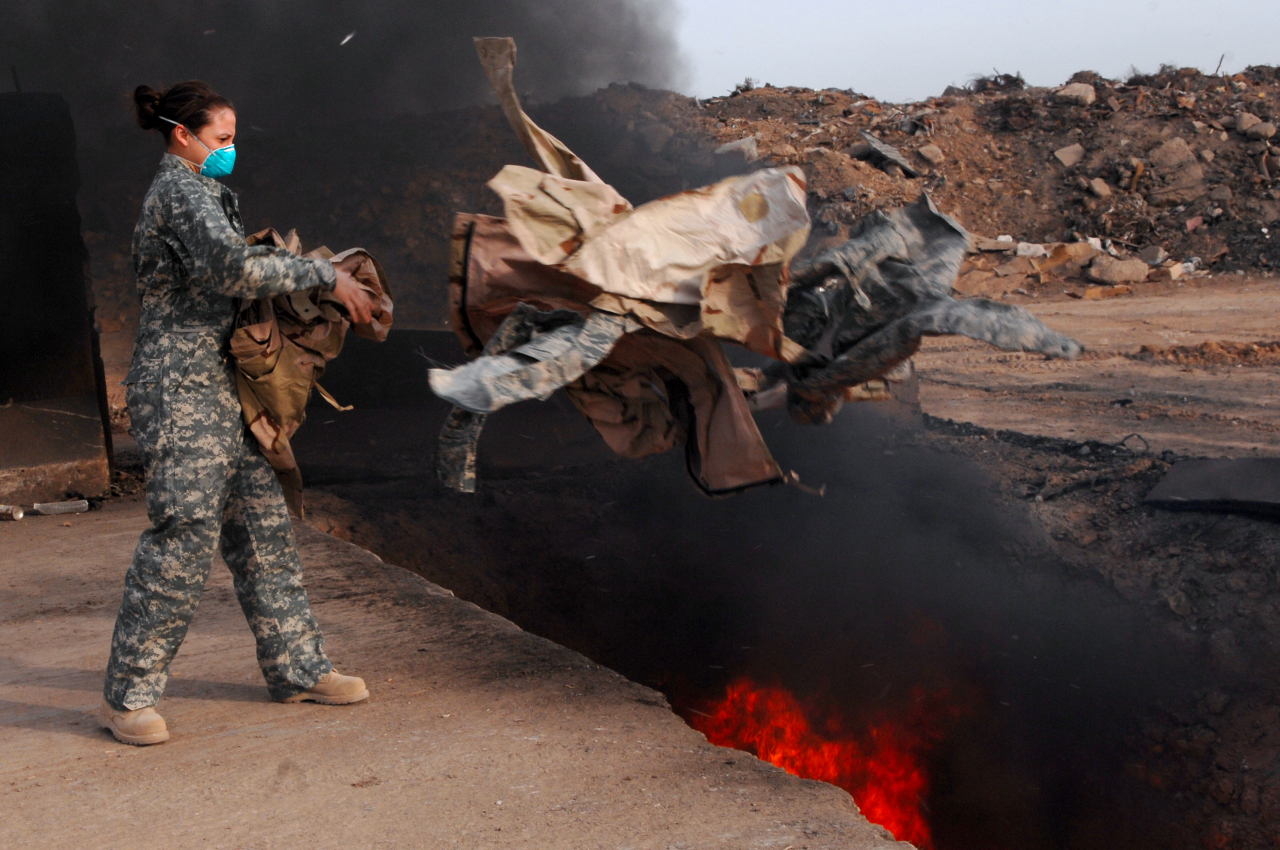
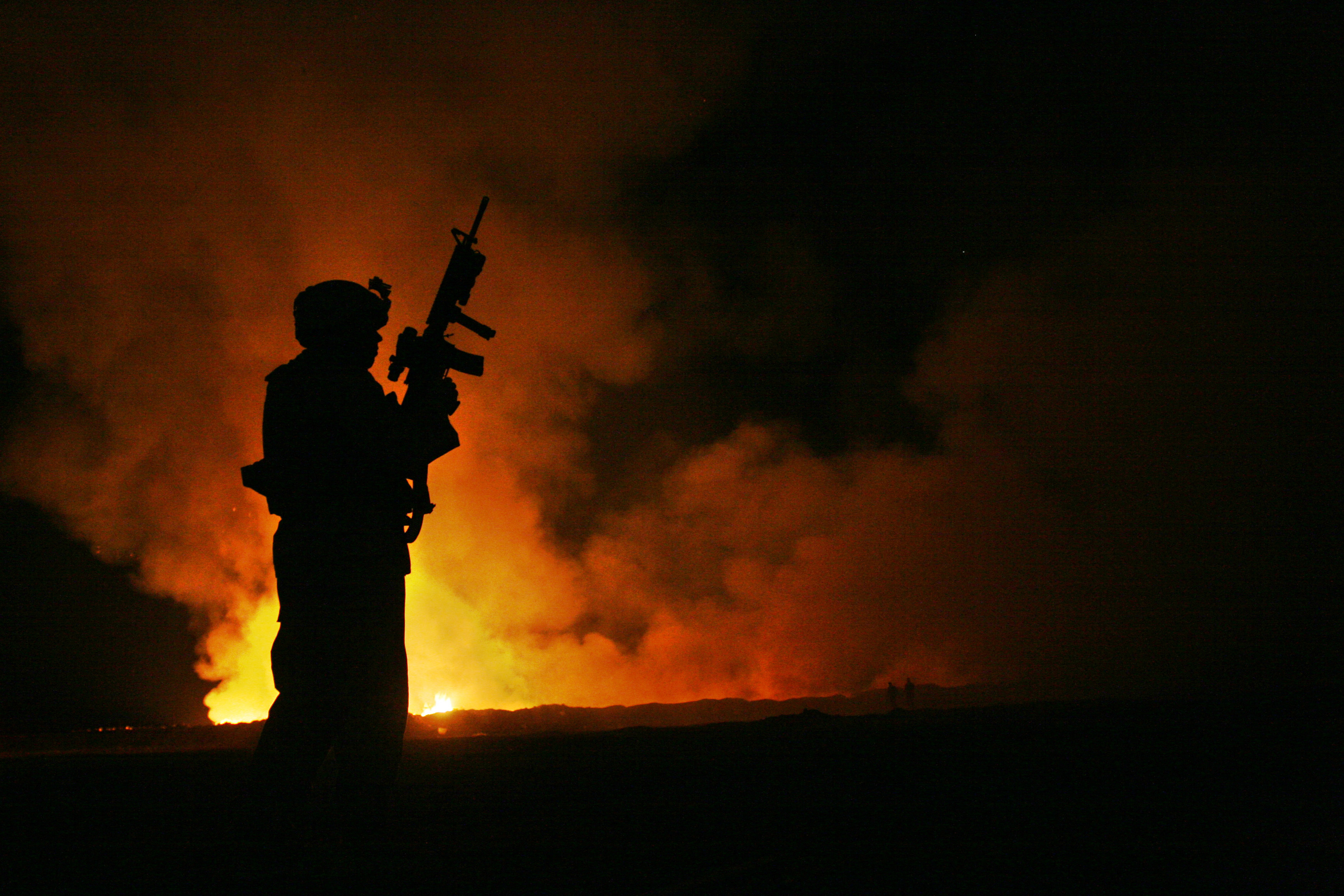
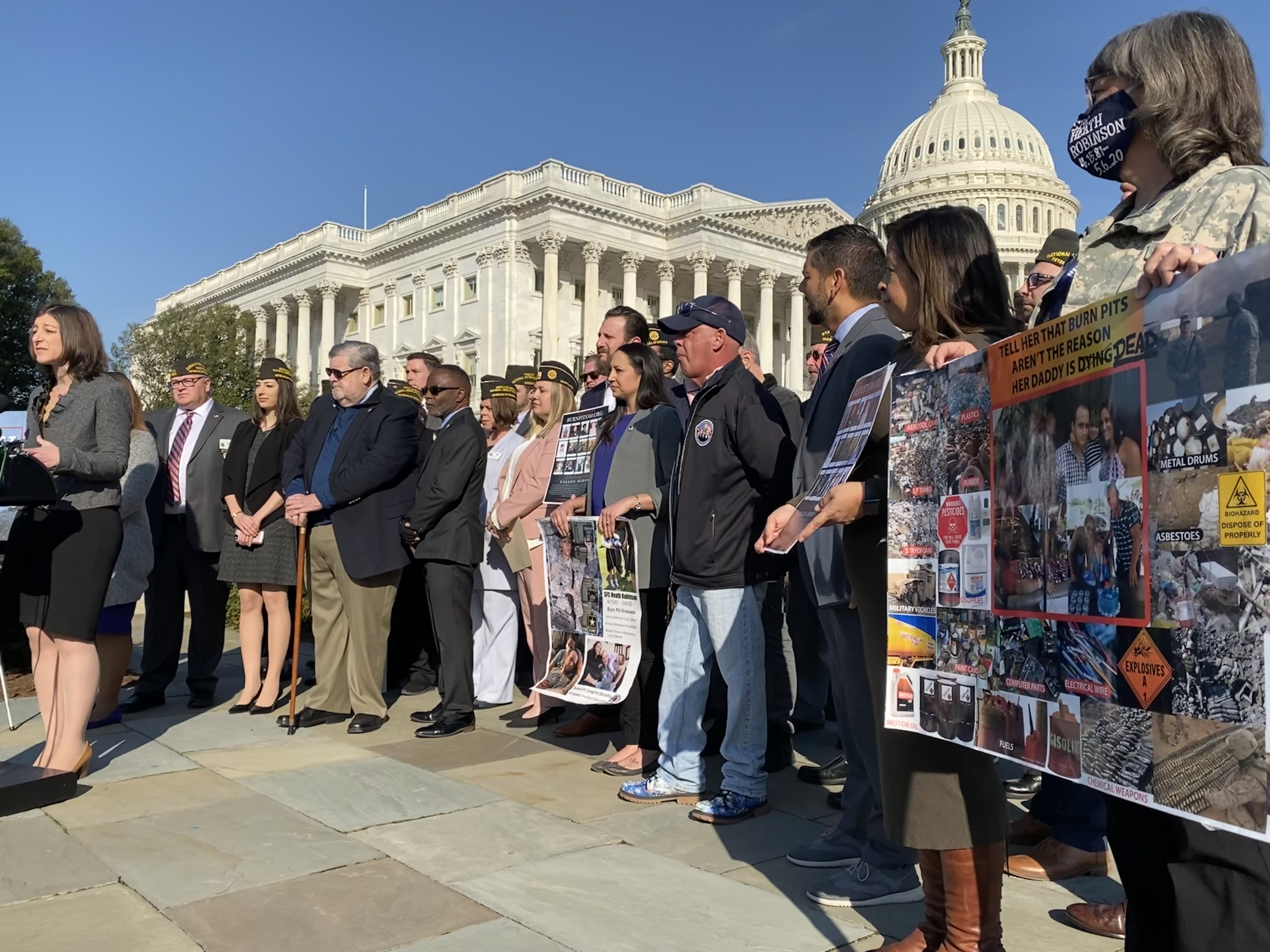
President Joe Biden is expected to sign the sweeping plan into law in coming days.
Comprehensive toxic exposure legislation that could provide new health care and disability benefits to millions of veterans is headed to the White House to become law after Senate lawmakers ended a week of turmoil surrounding the bill with a strong bipartisan vote. The Promise to Address Comprehensive Toxics Act — better known as the PACT Act — was adopted Tuesday by a 86-11 vote after a lengthy series of procedural moves by senators. Advocates called the move a historic change in how the Department of Veterans Affairs approaches toxic exposure injuries, in particular ones caused by burn pits used in combat zones. It was also the culmination of years of lobbying for sick veterans and nearly a week of constant protest on Capitol Hill. Angry veterans advocates scramble to save toxic exposure bill after surprise setback One week ago, 42 Senate Republicans blocked consideration of the measure in a surprise move that left veterans advocates panicked and upset. But after five days of an around-the-clock “fire watch” on the Capitol steps by veterans — some of whom suffer from burn pit injuries from their service — the GOP lawmakers relented and allowed the legislation to move forward. “This was all of us coming together for our veterans,” said Rosie Lopez-Torres, co-founder of the advocacy group Burn Pits 360, which helped author the legislation. “Knowing that we now have what we’ve been waiting on for 13 years, I think it’s time for a celebration.” What are military burn pits? And why are veterans worried about them? What the bill does The bill would potentially provide new support for about 3.5 million veterans, about one in every five living in America today. “What it does is make sure that veterans who have been exposed to toxins … are made whole again,” said Senate Veterans’ Affairs Committee Chairman Jon Tester, D-Mont. “We send these men and women off to war, we tell them to go off and protect our freedoms. They do it, and oftentimes things happen that change their lives. Sometimes we can see the injuries. Sometimes we can’t, especially in cases with toxic burn pits.” The burn pit provisions of the PACT Act have received the most attention in recent months, in part because of the visibility of those injuries. Tens of thousands of veterans from the wars in Iraq and Afghanistan have developed rare respiratory conditions and cancers in the years following their deployments, believed caused by poisonous smoke from massive burn pits used to dispose of a host of military waste. Now, under the bill, veterans who served in those war zones would be granted presumptive benefits status for 23 respiratory illnesses and cancers believed linked to the toxic smoke. That would speed up disability payouts to those individuals, awarding them up to several thousand dollars a month. Veterans who served in the recent wars would also be given five more years of medical care coverage under VA (they currently get five years) regardless of their health status. Veterans from older generations would also see new support under the measure. It dramatically expands benefits for illnesses believed to be linked to burn pit smoke in Iraq and Afghanistan, Agent Orange exposure in Vietnam and proximity to other harmful military contaminants in varied service eras. And the bill would codify recent changes in how VA approaches a host of military toxic exposure claims, lowering standards for proof and offering presumptive status for some rare illnesses believed linked to them. Advocates for years have lamented burdensome procedures to get VA to recognize their service-connected illnesses. Burn pits benefits bill concerns aren’t new, hinge on budget moves Why the bill was stalled On Tuesday, Tester praised the final passage of the measure but also acknowledged that getting the legislation finished “took far too long.” That critique included both years of fighting over bill specifics and the unexpected delays of the last week. Despite the final bipartisan vote, Republican lawmakers for months have voiced concerns about the cost of the measure — nearly $300 billion over the next 10 years — and the potential impact on VA benefits workloads. Senate leaders thought they had calmed those concerns with changes to the measure negotiated between Tester and Senate Veterans’ Affairs Committee ranking member Jerry Moran, R-Kan., earlier this spring. Those moves included adding money for more staff and more VA facility leases, and deferring some benefits for a few years. The House last month voted 342–88 to advance the measure, with key Republican leaders giving their blessing. But when the measure returned for procedural votes last week, all but eight Senate Republicans blocked it, saying they had newfound concerns with budgetary accounting issues. Sen. Pat Toomey, R-Pa., led that charge, saying that changes in discretionary spending rules included in the bill could lead to budget malfeasance in the future. But his recommended fixes were rejected in a 47-48 amendment vote shortly before final passage (60 votes were needed for adoption). “There is no doubt that the cost of caring for our veterans is high,” Moran said shortly before the Senate votes. “The truth is, freedom is not free. There is always a cost to war. And we need to remind ourselves that cost is not fully paid when the war ends.” Here are the veterans who will benefit from Congress’ sweeping toxic exposure bill White House support The measure now heads to the White House, where President Joe Biden has already pledged to sign it into law. Advocates are expecting a significant public signing ceremony in coming days. That event will be in sharp contrast to the last few days of protest outside the Capitol, where dozens of veterans camped to show their disapproval for the lawmakers blocking the bill. The protest was held in shifts around the clock, with veterans seeking cover under nearby trees and bus stops during frequent overnight Washington, D.C. downpours. Supporters — including the White House — sent water bottles and pizzas to help with the effort, and made frequent stops to chat with veterans as lawmakers inside negotiated a final compromise. Comedian Jon Stewart (who has spoken at numerous press conferences on the issue in recent years) and activist John Feal (a key voice in the fight for benefits for Sept. 11, 2001 first responders in New York) held frequent news events in recent days to amplify the message. The protest ended Tuesday with nearly 100 veterans being invited into the Senate chamber to witness the final vote first-hand. “This victory is the culmination of years of relentless work by all the national veterans and military organizations,” said IAVA Executive Director for Government Relations Tom Porter. “In the end, it was our commitment to the mission of following through for our brothers and sisters in arms, many who are no longer with us. We did this for them.” Veterans Affairs officials have said in recent days that they are preparing for the changes outlined in the bill, but have not yet offered any guidance on how veterans can apply for the new benefits or health care access.
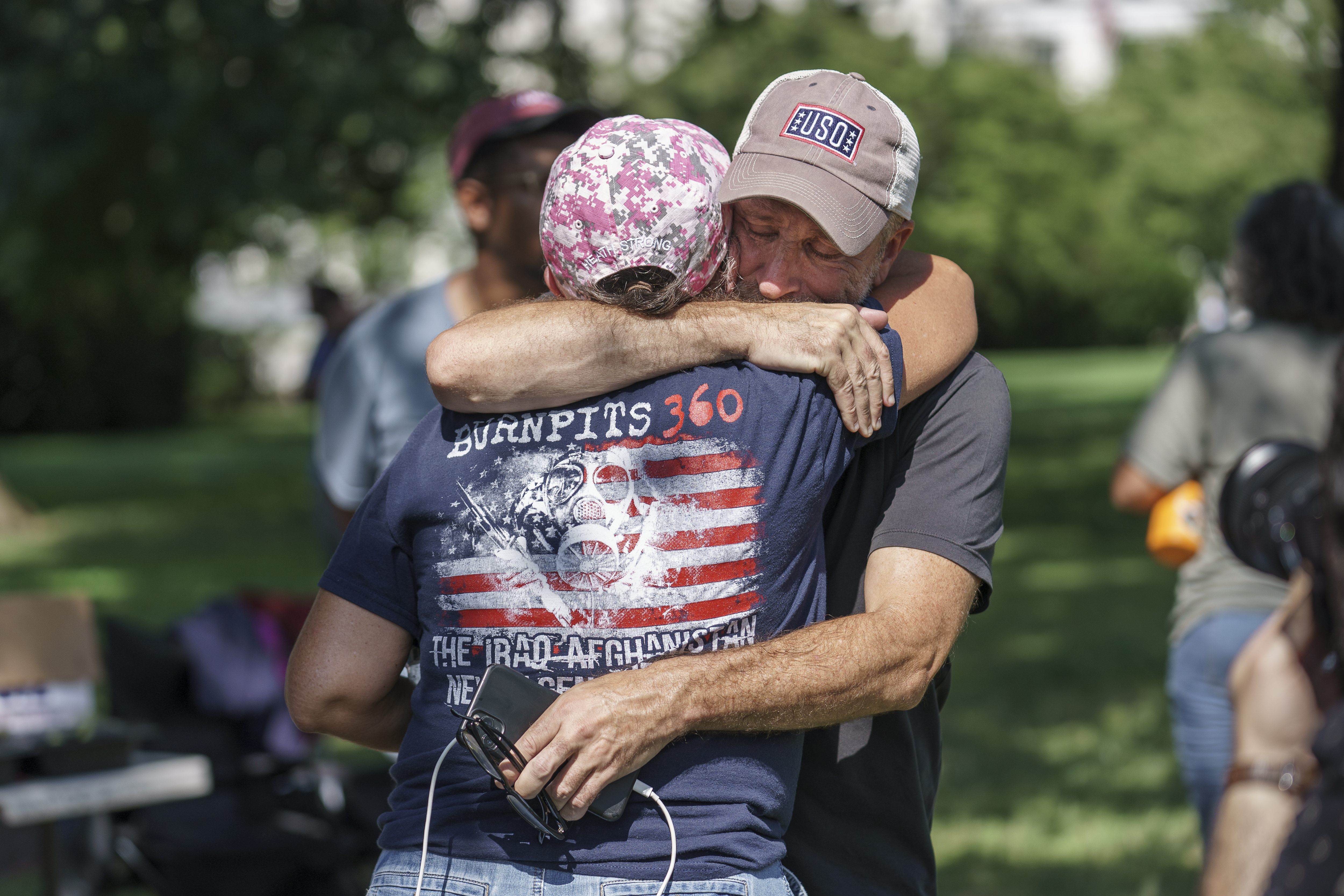
Twenty-five senators have called for VA to provide access to abortions in light of growing state opposition to the procedure.
Veterans Affairs Secretary Denis McDonough on Sunday would not back calls to provide abortions at department medical centers even as he pledged to find ways to ensure women veterans have access to the services regardless of where they live. The comments came just two days after 25 Senate lawmakers (all Democrats and independents) urged the department to begin offering abortions at VA medical centers to all veterans and eligible family members, in response to a growing number of states outlawing the procedure. “Last month’s disastrous Supreme Court decision … makes it even more critical that veterans receive access to the reproductive care to which they are entitled,” the group wrote in a letter to the VA secretary. “VA must urgently begin rulemaking to allow veterans and eligible dependents to receive abortions and all abortion-related services.” Service members, military doctors detail obstacles to abortion access Since the Supreme Court in June overturned the 1973 Roe v. Wade ruling, which legalized abortion nationwide, at least 23 states have started to place limits or already imposed restrictions on health care workers from providing abortions. Kentucky, Louisiana, Oklahoma, South Dakota and Texas have near total bans on the procedure. That has prompted abortion rights supporters in Congress to push administration officials to find ways to make the procedure more easily available to women in those states, including possibly using federal facilities. But whether VA has the authority to make such a move is in dispute. During a Senate Veterans’ Affairs Committee hearing on July 27, ranking member Sen. Jerry Moran, R-Kansas, reiterated his opposition to the idea and cited the Veterans Health Care Act of 1992, which prohibits abortions at VA medical locations. But in their letter to McDonough, the senators supporting the idea said that under the Veterans Health Care Eligibility Reform Act of 1996, the department can furnish “needed” medical care to veterans. “Importantly, the VA has used its authority to provide reproductive care such as pregnancy care and infertility services, even though such care was initially excluded from the health care packages allowed under the [1992 law],” they wrote. “We contend that the VA has the statutory authority and discretion to provide abortions and abortion-related services and resources.” McDonough has said publicly that VA general counsel has asserted the department is not statutorily prohibited from providing abortion counseling or abortion services, but has chosen not to engage in those practices in the past. Republican lawmakers strongly dispute that claim. Little guidance for troops, dependents who may need to end a pregnancy post-Roe But during an interview Sunday on CNN’s State of the Union, McDonough would not commit to any specific changes to address abortion access for veterans. “We’re looking very closely at that to ensure that there’s no reduction of services to [women veterans] and no risk to their lives as a result of these decisions,” he said. “Women veterans are the fastest growing group of veterans that we have in our care,” he added. “My preference is that they not face risks to their lives as a result of this decision from the court. We’re going to make sure that we’re in a position to take care of them.” In fiscal 2020, about 550,000 women veterans accessed VA health care services, and another 400,000 women dependents and survivors accessed care through related programs.

The “Ghost Army” formed in 1944 with a key job: deceive the German military as to the whereabouts of Army divisions.
RALEIGH, N.C. — When World War II veteran George Dramis came home, he didn’t talk much about the war. If someone asked what he did there, he’d tell them the truth: He was a radio operator. But there is much, much more to his story. Dramis, 97, was one of the 1,100 soldiers in the U.S. Army’s 23rd Headquarters Special Troops. Referred to now as the Ghost Army, they formed in 1944 with a key job: deceive the German military as to the whereabouts of Army divisions. This was after the D-Day invasion at Normandy, as Allied forces fought to free Europe from the Nazis. WWII ‘Ghost Army’ members to be awarded Congressional Gold Medal “We would come in at night,” Dramis told The News & Observer, explaining how the Ghost Army operated. “[An Army division] would sneak away, quietly. We would come in and fake their radio transmissions. We had huge half-tracks with tremendous speakers on them that you could hear for 15 miles. They were recorded things of actual troop movements — tanks, trucks, guys swearing, yelling ‘Get over here!’” he said. A half-track was an armored personnel carrier. Those speakers that carried sound for 15 miles weighed 500 pounds, Dramis said, and it sounded like a real division coming in. The Ghost Army used inflatable tanks, trucks and other equipment that would appear to be camouflaged, and soldiers even wore fake division patches. Those 1,100 troops used visual and audio deception to appear to be 15,000 troops. And as Dramis told people after the war when his work was still classified, he was indeed a radio operator. He kept the secret until 1996, when the Ghost Army’s efforts were declassified. There are just nine veterans of the Ghost Army still living. With a bill co-sponsored by North Carolina’s U.S. Rep. Deborah Ross and signed into law by President Joe Biden in February, those men will receive a Congressional Gold Medal. Ross, a Democrat, and Republican Sen. Thom Tillis’ staffer Trey Lewis were among those who attended a recent ceremony at the Waltonwood Lake Boone assisted living community in Raleigh. One of Dramis’ modern counterparts was at the ceremony, too. Army Col. Chris Stangle is commander of the 4th Psychological Operations Group, 1st Special Forces Command (Airborne), at Fort Bragg. Stangle told Dramis that Special Operations was built off of what the Ghost Army started. Stangle told The N&O that the work Dramis did has been built upon with techniques used by what is known as PSYOP today. Like at other ceremonies of recent years honoring World War II veterans, speakers often call them heroes, including Dramis. “They keep talking about this hero part all the time. Well, I’m not so sure about that hero stuff,” Dramis told those gathered. “The 18-, 19-year-old, 20-year-old guys that” — Dramis paused and took a deep breath — “maybe lasted one minute or two minutes or three minutes, and they never made it. They never got to grow up and have a life … those guys are the heroes.” After the war, Dramis was a factory worker and eventually president of an industrial supply company before he retired in 1990, according to the Ghost Army Legacy Project. He and his late wife had four children, and Dramis’ two living sons attended the ceremony, along with two of Dramis’ grandsons. Saturday, July 23, 2022, was also proclaimed George Dramis Day by Raleigh Mayor Mary-Ann Baldwin. Dramis’ son Jim Dramis, of Raleigh, wrote in The Charlotte Observer last year about the Ghost Army Legacy Project’s years-long push to get the bill passed so his father and others would be recognized with a Congressional Gold Medal. While the medal is still being minted, ceremonies for George Dramis and other Ghost Army veterans are already being held.
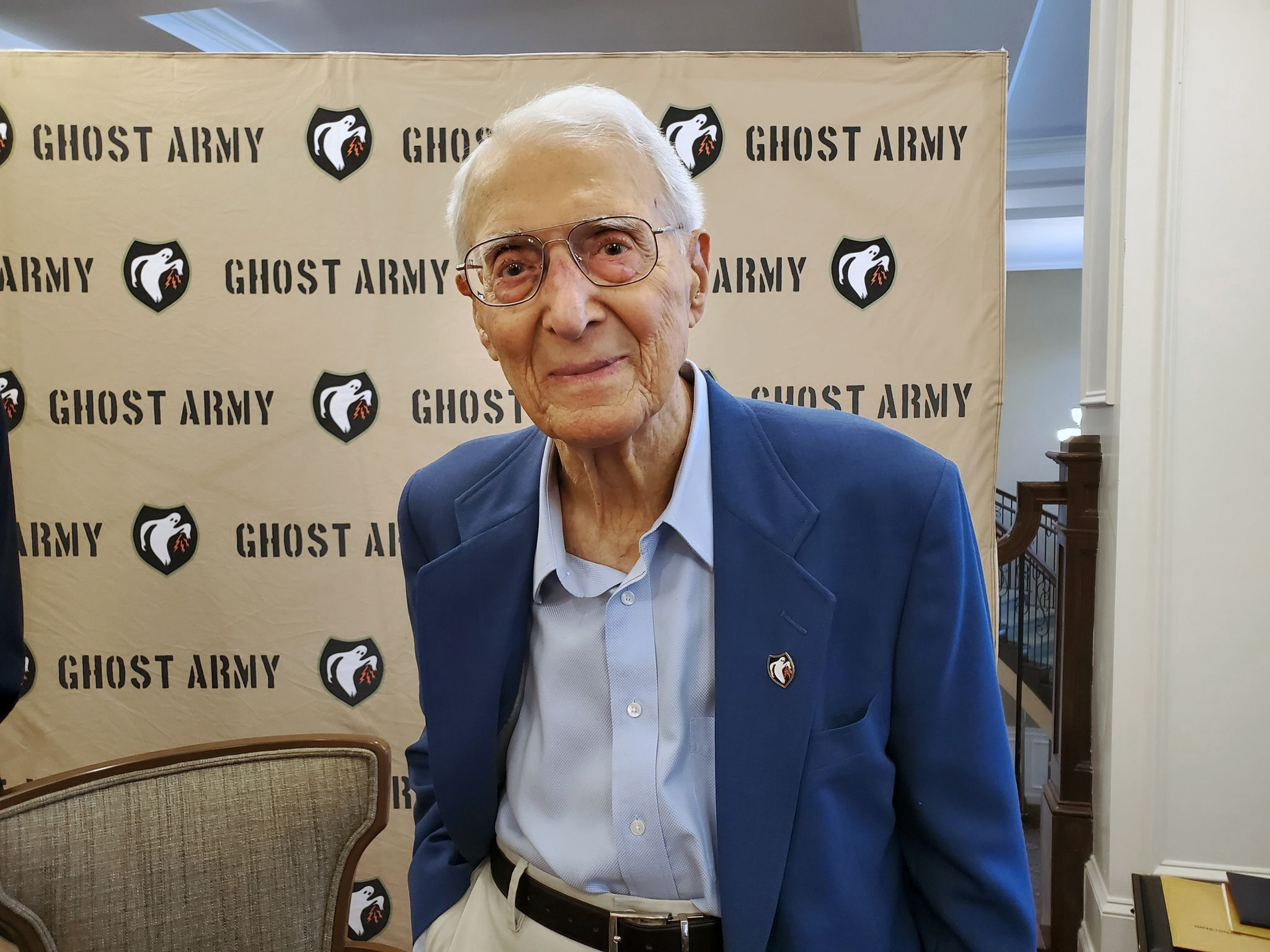
Hundreds of Navajos were recruited from the vast Navajo Nation to serve as Code Talkers with the U.S. Marine Corps. Only three are still alive today.
Samuel Sandoval, one of the last remaining Navajo Code Talkers who transmitted messages in World War II using a code based on their native language, has died. Sandoval died late Friday at a hospital in Shiprock, New Mexico, his wife, Malula told The Associated Press on Saturday. He was 98. Hundreds of Navajos were recruited from the vast Navajo Nation to serve as Code Talkers with the U.S. Marine Corps. Only three are still alive today: Peter MacDonald, John Kinsel Sr. and Thomas H. Begay. More money needed for New Mexico Navajo Code Talkers Museum The Code Talkers took part in every assault the Marines conducted in the Pacific, sending thousands of messages without error on Japanese troop movements, battlefield tactics and other communications critical to the war’s ultimate outcome. The code, based on the then-unwritten Navajo language, confounded Japanese military cryptologists and is credited with helping the U.S. win the war. Samuel Sandoval was on Okinawa when got word from another Navajo Code Talker that the Japanese had surrendered and relayed the message to higher-ups. He had a close call on the island, which brought back painful memories that he kept to himself, Malula Sandoval said. The Navajo men are celebrated annually on Aug. 14. Samuel Sandoval was looking forward to that date and seeing a museum built near the Navajo Nation capital of Window Rock to honor the Code Talkers, she said. “Sam always said, ‘I wanted my Navajo youngsters to learn, they need to know what we did and how this code was used and how it contributed to the world,’” she said Saturday. “That the Navajo language was powerful and always to continue carrying our legacy.” Sandoval was born in Nageezi near Chaco Culture National Historical Park in northwestern New Mexico. He enlisted in the Marine Corps after attending a Methodist school where he was discouraged from speaking Navajo. He helped recruit other Navajos from the school to serve as Code Talkers, expanding on words and an alphabet that an original group of 29 Navajos created. Sandoval served in five combat tours and was honorably discharged in 1946. The Code Talkers had orders not to discuss their roles — not during the war and not until their mission was declassified in 1968. The roles later became an immense source of pride for Sandoval and his late brother, Merrill Sandoval, who also was a Code Talker. The two became talented speakers who always hailed their fellow Marines still in action as the heroes, not themselves, said Merrill Sandoval’s daughter, Jeannie Sandoval. “We were kids, all growing up and we started to hear about the stories,” she said. “We were so proud of them, and there weren’t very many brothers together.” Sandoval was curious, always reading the local newspapers, and attending community, veterans, Code Talker and legislative meetings. He enjoyed traveling and sharing what he learned, grounded in his Diné beliefs and the Navajo way of life, said one of his daughters, Karen John. “It was engrained early in me, to be part of the community,” she said. “He was really involved in a lot, some of which I couldn’t comprehend as a kid.” Samuel Sandoval often told his story, chronicled in a book and documentary of the same name — “Naz Bah Ei Bijei: Heart of a Warrier” — at the Cortez Cultural Center in Cortez, Colorado. He had a favorite folding chair there with vinyl padding and took coffee black, said executive director Rebecca Levy. Levy said Sandoval’s talks drew dozens of people, some of whom had to be turned away because of space limitations. “It was a great opportunity for people who understood how important the Navajo Code Talkers were to the outcome of the war, in our favor ... to thank him in person,” Levy said. Sandoval’s health had been declining in recent years, including a fall in which he fractured a hip, Malula Sandoval said. His last trip was to New Orleans in June where he received the American Spirit Award from the National World War II Museum, she said. MacDonald, Kinsel and Begay also were honored. Sandoval and his wife met while he was running a substance abuse counseling clinic, and she was a secretary, she said. They were married 33 years. Sandoval raised 11 children from previous marriages and in blended families, John said. Navajo President Jonathan Nez said Sandoval will be remembered as a loving and courageous person who defended his homeland using his sacred language. “We are saddened by his passing, but his legacy will always live on in our hearts and minds,” Nez said in a statement. Navajo Nation Council Speaker Seth Damon said Sandoval’s life was guided by character, courage, honor and integrity, and his impact will forever be remembered. “May he rest among our most resilient warriors,” Damon said in a statement. Funeral services are pending.
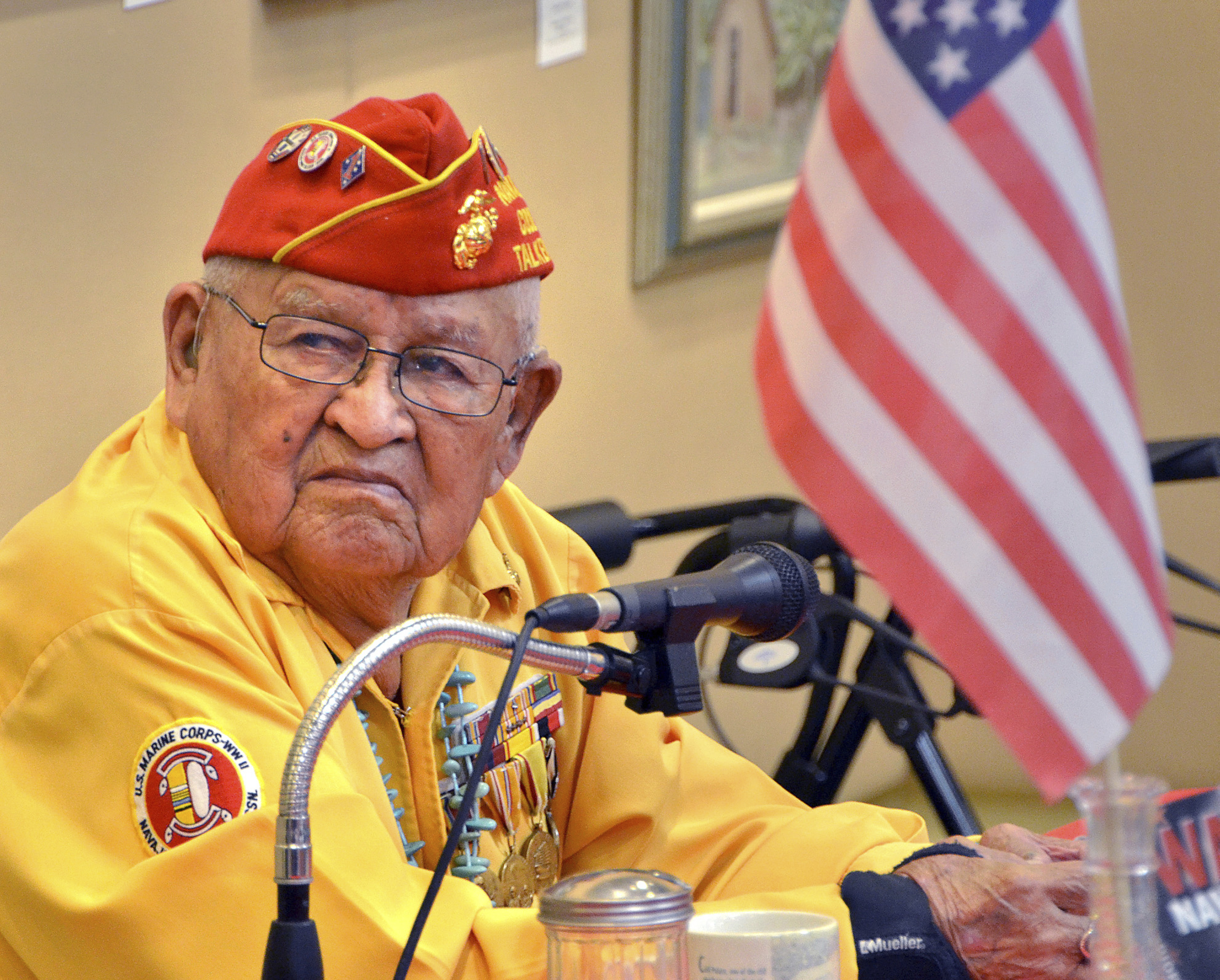
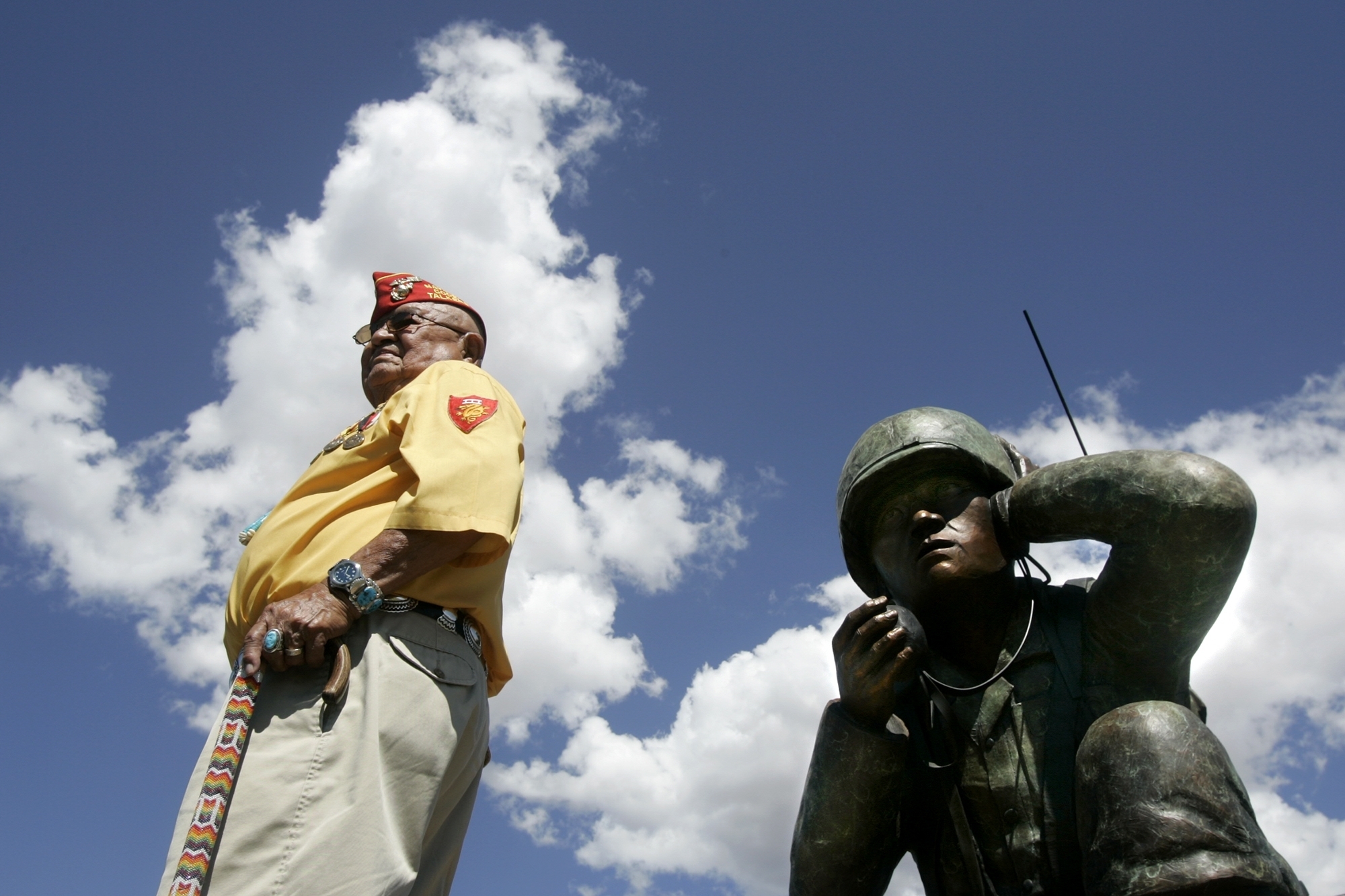
Republicans have accused Democrats of making new changes to complicate the sweeping veterans policy measure, but the budget issues they cite have been in the bill for months.
The fate of over sweeping military toxic exposure legislation that could benefit millions of American veterans now hinges on a fight over government accounting methods and whether that’s actually Republican senators’ real concerns over the nearly $300-billion measure. Senate Democrats are expected to bring up the Promise to Address Comprehensive Toxics Act, also known as the PACT Act, for another procedural vote on Monday afternoon. If they can get 60 votes for the action, the bill is likely to pass by the end of the week, and be signed into law by President Joe Biden a few days later. Veterans advocates have been lobbying for the measure for years, saying it would dramatically expand benefits for veterans suffering illnesses from burn pit smoke, Agent Orange exposure, radiation poisoning and a host of other military toxic exposure events. Angry veterans advocates scramble to save toxic exposure bill after surprise setback The bill advanced on a 342–88 vote in the House two weeks ago with significant Republican support and was supported by 34 Republicans in the Senate during an 84–14 vote in June. But last week, during a procedural cloture vote that was widely assumed only to be a formality, 25 Republicans flipped their vote to block the measure, saying they have newfound concerns with accounting issues that Democrats inserted into the measure. New concerns? The problem centers on how some benefits spending in the bill will be classified in federal budgeting procedures. Sen. Pat Toomey has led the charge, saying it could amount to billions in extra discretionary government spending over the next decade. “If we change [the law] to the way that the Democrats want, it creates room in future budgets for $400 billion of totally unrelated, extraneous spending on other matters,” he said during an appearance on CNN’s State of the Union on Sunday. “That’s what I want to prevent.” Toomey’s concerns are the same he raised in June, when he was one of the 14 senators who objected to the PACT Act’s final passage. The bill has undergone minor technical changes since then. Several Republican senators who objected last week have justified their flip in recent days by insisting that Democrats only recently inserted the problematic issues into the bill, but the discretionary spending language provisions are the same as June, when the measure easily passed the Senate. Veterans advocates have called the new messaging over the objections insincere. “Twenty-five senators who voted for the PACT Act last month changed their vote on the exact same bill,” said Veterans of Foreign Wars National Commander Tim Borland in a statement. “[They] are risking more veterans getting sick and dying with every day this is delayed.” Here are the veterans who will benefit from Congress’ sweeping toxic exposure bill On Thursday, Sen. Chris Murphy, D-Conn., accused Republican senators of playing politics instead of really caring about the bill’s specifics. The failed PACT Act vote last week occurred just as Senate Democratic leaders announced the framework for new comprehensive health care and climate change legislation. “The less charitable explanation is this: Republicans are mad that Democrats are on the verge of passing climate change legislation and have decided to take out their anger on vulnerable veterans,” he said. Discretionary vs. mandatory spending Both advocates and administration officials have also disputed Toomey’s concerns about the accounting issues. In federal budgeting, spending classified as mandatory (which includes things like veterans benefits checks and Social Security payouts) is set in law and renewed annually. Discretionary spending, which includes program operations, can change each year depending on the whims of lawmakers. Toomey has said he does not have concerns with categorizing the new benefits included in the PACT Act (about $279 billion over 10 years) as mandatory spending. But he insists that provisions to move other existing toxic exposure benefits spending in the annual VA budget from the discretionary budget to the mandatory one opens up the door for budgetary gimmicks down the road. “We are spending way too much money [in the federal budget],” he said. “To hide behind a veterans bill the opportunity to go on an unrelated spending spree is wrong.” That theoretical spending would not be included in the PACT Act. But by reducing the total amount of discretionary spending in the non-defense side of the federal budget, future appropriators could have more flexibility to shift money into other non-veteran programs. Despite cost, veterans’ toxic exposure bill gains bipartisan backing After last week’s failed cloture vote, Senate Veterans Affairs Committee Chairman Jon Tester, D-Mont., blasted Toomey’s arguments baseless, saying that the normal appropriations process allows those kinds of debates each year. And Veterans Affairs Secretary Denis McDonough on Sunday said requiring this block of veterans spending to remain in the discretionary budget would only endanger veterans’ benefits. “The impact of [Toomey’s plan] is we may have to ration care for veterans,” he said on CNN. “The estimates he uses set caps on what we can invest in people.” Senate Majority Leader Chuck Schumer, D-N.Y., said he will allow a vote on Toomey’s plan to change the accounting methods, but will require a 60-vote minimum for passage. Toomey has said he wants a simple majority vote, and floor time for other Republican amendments. If the Senate amends the bill, it will need to go back to the House again for another vote before final passage. That likely wouldn’t happen until September, since the House began its summer recess on Friday. If Monday’s planned vote simply fails again, the fate of the measure at any point this year is unclear. Toomey insisted that a compromise can be found, but offered no timeline for when that might happen. The Senate is due back in for legislative business at 3 p.m. on Monday.
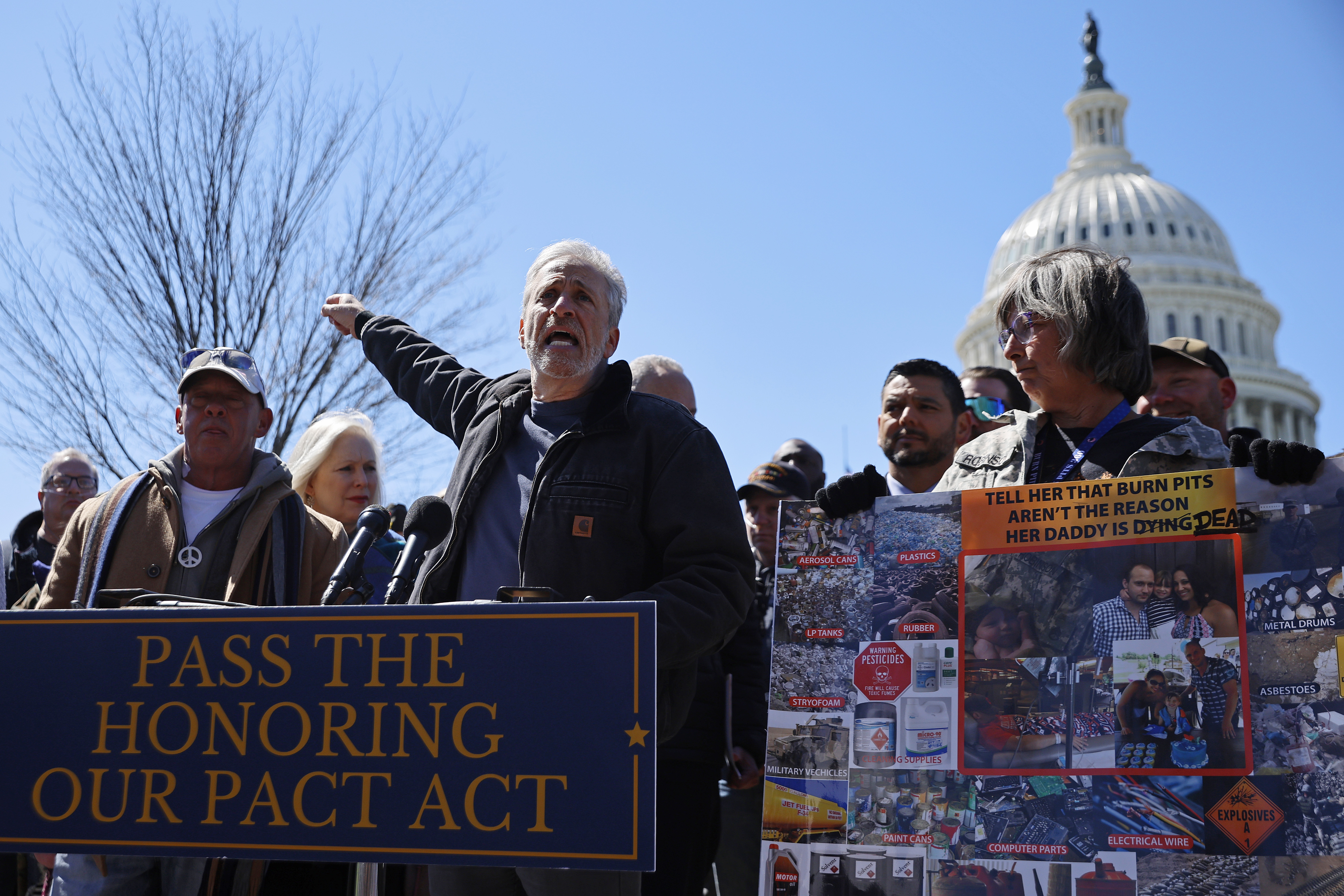
Walter Glenn Primrose and his wife have been charged with stealing identities of two dead children.
HONOLULU — A U.S. defense contractor and his wife charged with fraudulently living for decades under the stolen identities of two dead infants told family they were going into the witness protection program before abruptly abandoning their house and leaving Texas about 40 years ago, a federal prosecutor said Thursday. At some point, Walter Glenn Primrose and Gwynn Darle Morrison reemerged with new names and other explanations for lives cloaked in mystery. The couple told people they were dodging legal and financial trouble, Assistant U.S. Attorney Wayne Myers said. Primrose told someone he was a government agent who couldn’t be photographed. Intriguing details that emerged during a bail hearing in a Honolulu court were enough to get Primrose detained without bail, but provided little clarity why the couple shed their past and whether the criminal case against them is more serious than identity theft. Myers successfully sought to have Primrose detained because his “life has been a fraud for the last several decades,” including more than 20 years in the U.S. Coast Guard where he earned a secret-level security clearance. After retiring in 2016, he used the secret clearance for his defense job. A search of the couple’s Hawaii home turned up Polaroids of the couple wearing jackets that appear to be authentic Russian KGB uniforms, Myers said. An expert determined the snapshots were taken in the 1980s. The search also yielded an invisible ink kit, documents with coded language and maps showing military bases, Myers said. When the couple were left in a room together, they were recorded saying “things consistent with espionage,” Myers said. “We think the defendant is obviously quite adept at impersonating other people, obtaining government ID documents, fraud, avoiding detection,” Myers said. “He may — we’re not saying for sure — but he may have some troubling foreign connections. And if he does, he might be able to use those to enlist help.” Federal defender Craig Jerome said the government only provided “speculation and innuendo” that the couple was involved in something more nefarious than “purely white-collar nonviolent offenses.” “If it wasn’t for the speculation that the government’s injected into these proceedings without providing any real evidence ... he would certainly be released,” Jerome said. Morrison faces a bail hearing Tuesday. Her lawyer said the couple — regardless of their names — had lived law-abiding lives. Attorney Megan Kau told The Associated Press the couple posed for photos in the purported KGB jacket for fun. “She wants everyone to know she’s not a spy,” Kau said. “This has all been blown way out of proportion. It’s government overreaching.” The couple, who were arrested Friday, July 22, at their Kapolei home, are charged with conspiracy to commit an offense against the U.S., false statement in passport application and aggravated identity theft. They face up to 17 years in prison if convicted of all charges. Inside their house, investigators discovered correspondence in which an associate believed Primrose had joined the CIA or had become a terrorist, Myers said. When they left Texas in the early 1980s and claimed they were protected witnesses, they handed over the keys to their Nacogdoches house and told family members to take anything they wanted. The house was later foreclosed on. In 1987, Primrose took on the identity of Bobby Edward Fort, an infant who died in 1967 in Burnet, Texas. Morrison took the identity of Julie Lyn Montague, who died in 1968 at the same hospital as Fort. Primrose and Morrison, both born in 1955, were more than a decade older than the birth dates listed on their new IDs. “The defendant and his wife reportedly told yet other associates that they needed to change their names because of legal and financial reasons,” Myers said. “And that going forward they can be contacted using their new names, Fort and Montague.” They remarried under their assumed names in 1988, according to court records. Morrison used her real name to open a post office box, where she told family to contact her. When her father died, her family couldn’t reach her and enlisted local law enforcement to track her down. “Even the defendant’s family cannot find him when they need to,” Myers said. Prosecutors feared Primrose would flee if freed. They noted in court papers that he was an avionics electrical technician in the Coast Guard and was highly skilled to communicate secretly if released. The judge said he based his detention order on the alleged fraud “over multiple occasions spanning a long period of time.” Melley reported from Los Angeles.


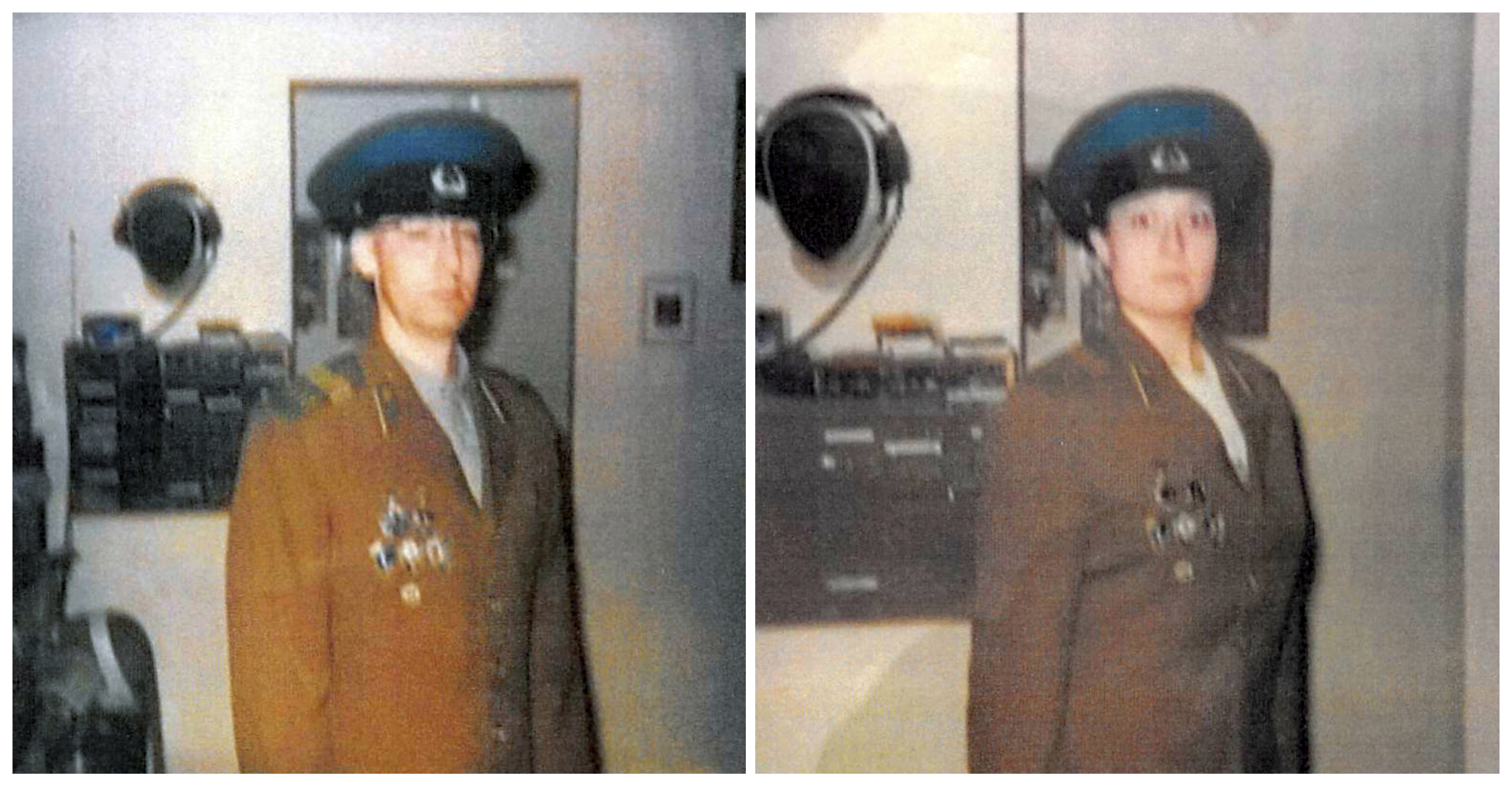
Alex Drueke and Andy Huynh are believed to be the first Americans captured while fighting against Russian forces.
BIRMINGHAM, Ala. — Two Americans captured while fighting with the Ukrainian Army apparently have been sent to a prison where they are spending all their time together, the family of one of the men said. Alex Drueke, who was captured with fellow veteran and Alabama resident Andy Huynh in early June, told his mother about the transfer in a telephone call, according to a statement issued late Thursday by the Drueke family. “He sounded strong and clear-minded. He said he and Andy have been moved to a traditional prison, that they are no longer in solitary confinement but that they are together now 24/7,” said Lois “Bunny” Drueke, his mother. The men are believed to be the first Americans captured while fighting for Ukraine. A third man is in a cell with the pair but Drueke didn’t disclose his name and Drueke said she didn’t press for the information for fear of the call being disconnected. Drueke and Huynh failed to return to a meeting spot after their group came under heavy fire in the Kharkiv region of northeastern Ukraine near the Russian border on June 9. The two traveled to help Ukraine separately and became friends in part because of their shared Alabama background, relatives have said.

The move comes after Senate Republicans blocked the legislation earlier this week.
By 11 p.m. Friday, all the senators who had roamed the halls of Congress this week were gone from Capitol Hill. But the veterans weren’t. A contingent of about 15 veterans — most of whom had spent the prior 48 hours meeting with lawmakers to discuss new toxic exposure legislation — were camped out on the Senate steps even as rain began to come down steadily. More were expected to arrive after midnight. Plans called for an around-the-clock fire watch of advocates at the Capitol to last until Monday afternoon, when the Senate is again scheduled to vote on the Promise to Address Comprehensive Toxics Act, better known as the PACT Act. The goal was to emphasize — throughout the weekend — the importance of action on the issue, even if no lawmakers were present to see it. New benefits for burn pit victims in limbo after Senate Republicans block plan “We’re here to let the Senate know that we’re not going home and neither should they until they get the PACT Act done,” said Patrick Murray, director of the Veterans of Foreign Wars National Legislative Service. Veterans groups have been searching for ways to bring pressure and urgency on senators since Wednesday, when a procedural vote on the measure failed in surprising fashion. The measure — which could expand medical options and benefits for as many as one in five veterans living in America today — passed out of the Senate in June by a comfortable bipartisan 84-14 margin. But after it was approved with technical corrections by the House, Senate Republicans chose to block the bill, with 27 GOP members unexpectedly changing their vote from the previous month. Reasons for the surprise opposition include lingering concerns about how some benefits spending will be classified in future budgets and anger over unrelated health care and climate change legislation announced by Senate Democrats this week. But the veterans standing watch outside the Capitol said none of those factors justify stalling the sweeping veterans policy measure when passage appeared all but certain after years of advocacy and lobbying work. Kristen Rouse, a board member of Iraq and Afghanistan Veterans of America and an Army veteran with three tours in Afghanistan, traveled from New York to Washington, D.C., on Friday to be part of the event. “Veterans are sick and dying,” she said. “I may be next. I was exposed to thick constant smoke for a full year in Afghanistan. The very least I can do is show up to pull a shift on the Capitol steps with these fighters. “We need the Senate to come back and get to work. Suffering veterans don’t get any breaks. They shouldn’t be on recess or whatever they’re doing. Veterans need help now.” Jon Stewart goes nuclear at Capitol after PACT Act blocked Advocates brought coolers, camp chairs and pizza to their late-night protest shift. They sent texts to fellow veterans about the effort throughout the night and passed time by watching clips of Jon Stewart, the comedian-turned-activist who spoke at a veterans rally on Capitol Hill Thursday, skewering Republicans on social media for their opposition to the bill. Veterans said several House lawmakers — but no senators — stopped to chat on Friday afternoon to offer support for the effort. Other passersby approached to ask about the bill and what it could mean for the veterans community. The plan, which calls for about $300 billion in spending over the next 10 years, would establish a presumption of service connection for 23 respiratory illnesses and cancers related to the smoke from burn pits used in Iraq and Afghanistan. It would also extend Veterans Affairs medical care for those vets, from five years after service to 10 years. It would also provide new benefits for veterans who faced radiation exposure during deployments throughout the Cold War; veterans dealing with hypertension and monoclonal gammopathy from the Vietnam War, and new Agent Orange presumptive status for veterans who served in Thailand, Laos, Cambodia and Guam during the 1960s and 1970s. Here are the veterans who will benefit from Congress’ sweeping toxic exposure bill Senate Democrats said they are hopeful that a deal can be reached to move ahead with the bill by Monday afternoon, when the chamber is expected to return from a weekend break for a final week of work before its month-long summer recess. As the weekend began, the advocates on the Senate steps were hopeful that their vigil there will only last until that Monday procedural vote. “This is a bill that should have been passed a month ago,” said Aleks Morosky, deputy director of government affairs for Wounded Warrior Project. “When it came back over to the Senate, the people that voted for it last time, they chose to vote no on it. And that is unacceptable. “So, we’re here to get the Senate to pass this bill without any more delays.”
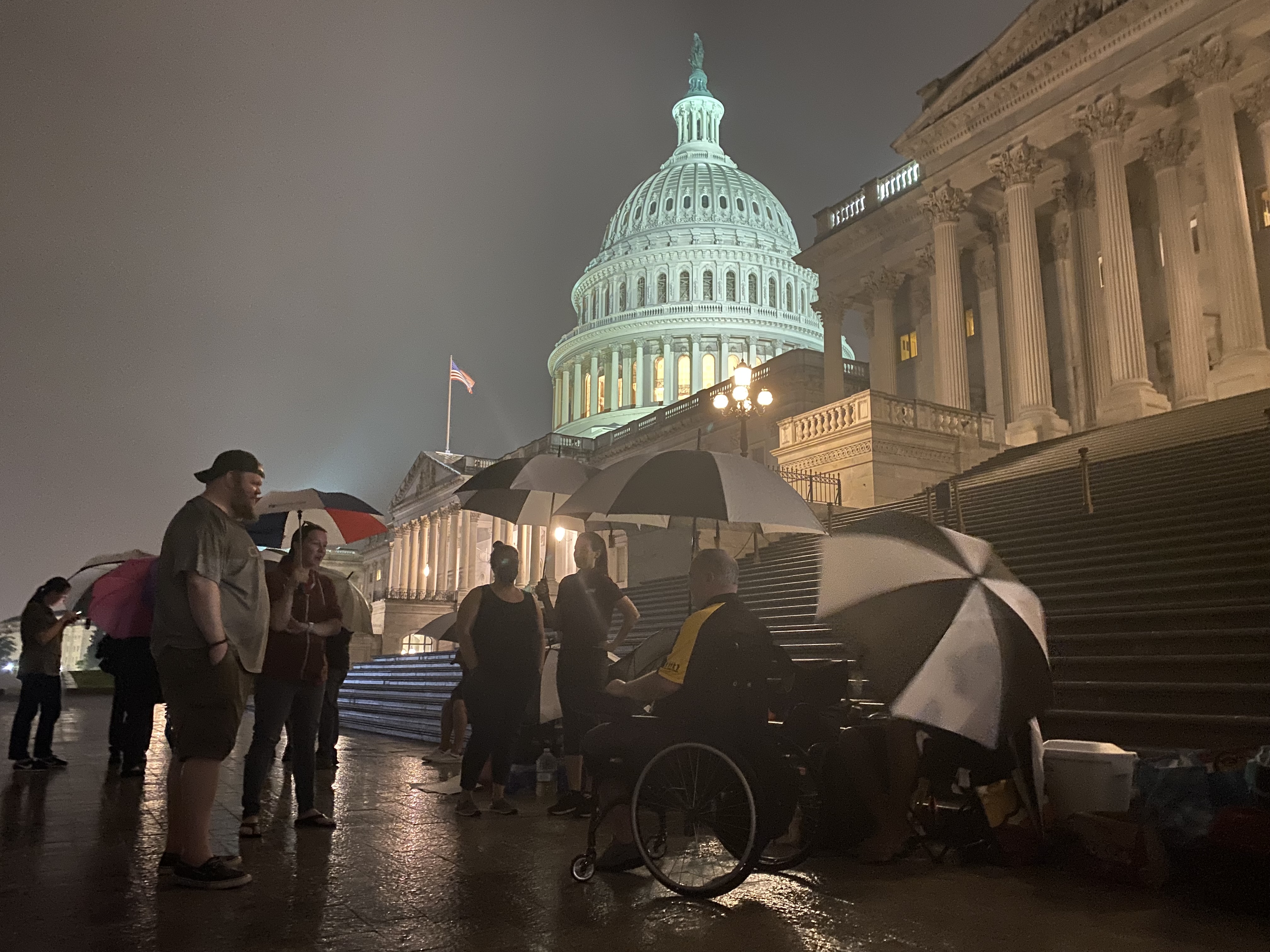
But when the plan could be voted on by Congress remains unclear.
Plans for a $300-billion budget for the Department of Veterans Affairs in fiscal 2023 appear likely to become law after Senate appropriators backed that target in their latest spending proposal. But when lawmakers will formally approve the funding deal remains unclear. On Thursday, Democrats on the Senate Appropriations Committee released their draft budget for next year, a $1.7 trillion plan that includes about $300 billion for VA operations. That figure closely mirrors both the mark approved for veterans programs and benefits by the House Appropriations Committee last month and what was suggested by the White House earlier this year. In a statement, Sen. Martin Heinrich, D-N.M. and chair of the appropriations committee’s veterans panel, said the proposal “provides a groundbreaking investment in VA healthcare and research, and funds VA’s efforts to improve infrastructure and modernize the disability claims process.” If approved, the budget would be about a 10% increase from fiscal 2022 levels and represent the largest spending plan in department history. Largest budget in VA history gets backing from House appropriators It would also mark another year of significant growth for VA program spending, even as other federal departments have seen cuts in recent years. In 2001, the entire VA budget — including both discretionary program spending and mandatory benefits payouts — amounted to about $45 billion. By 2013, the budget totaled $139 billion, still less than half of this year’s request. Despite that dramatic rise, lawmakers have generally backed the growth in VA spending, and appear more in sync on the veterans spending plan than other budget proposals. For example, Senate and House appropriators have already offered at least four different budget targets for the Defense Department for fiscal 2023, ranging from $762 billion to $847 billion. Angry veterans advocates scramble to save toxic exposure bill after surprise setback Chamber leaders are expected to spend the next few months negotiating a compromise on those differences. Meanwhile, the comparatively non-controversial VA spending plan is unlikely to move ahead until the entire federal budget plan is agreed upon. The $300 billion Senate plan for VA includes $13.9 billion for mental health care (up 6% from this year), $2.7 billion for homeless assistance programs (up 24%), $911 million for gender specific health care programs (up 8%) and $183 million for substance abuse disorder programs (up 17%). If lawmakers cannot reach a full federal spending plan before the end of the current fiscal year (Sept. 30), they will need to adopt a short-term budget extension to stave off a partial government shutdown. If that does not happen, however, most VA programs and operations will continue even without an active budget plan because Congress approves advanced appropriations for the department annually. That will keep benefits checks, hospital services and related support programs active even if a political fight shuts down other departments.

"We just want to know why veterans are getting screwed.”
Veterans advocates scheduled a victory-lap press conference outside the Capitol for Thursday morning in anticipation of passing new toxic exposure benefits legislation. But after 41 Senate Republicans blocked the measure on Wednesday night, the event turned into a obscenity-laced rage fest instead. “America’s heroes who fought our wars are outside sweating their asses off, battling all kinds of ailments, while these motherfuckers sit in the air conditioning walled off from any of it,” comedian and activist Jon Stewart told the grumbling crowd. “They don’t have to hear it. They don’t have to see it. They don’t have to understand that these are human beings suffering. “They haven’t met a war they won’t sign up for and haven’t met a veteran they won’t screw over.” New benefits for burn pit victims in limbo after Senate Republicans block plan Now, after supporters believed they were just a few procedural votes away from a monumental congressional victory, they’re left wondering whether their anger can restart legislative momentum on the stalled veterans bill and salvage something from years of lobbying efforts. The measure — the Promise to Address Comprehensive Toxics Act, or PACT Act — could affect benefits for as many as one in five veterans living in the U.S. today. It has been touted for months as potentially the most significant veterans policy changes in years. It dramatically expands benefits for illnesses believed to be linked to burn pit smoke in Iraq and Afghanistan, Agent Orange exposure in Vietnam and proximity to other harmful military contaminants in varied service eras. It also would force changes in how the Department of Veterans Affairs evaluates and awards benefits for those kinds of illnesses in the future. The PACT Act was expected to pass out of Congress in late June, but a technical correction mandated another set of votes in the House and Senate for final approval. It advanced on a 342–88 vote in the House two weeks ago with significant Republican support and already had been supported in the Senate with a 84–14 vote in June. But 27 Republicans changed their support during a procedural vote Wednesday evening, sidelining the bill for now and frustrating supporters who thought their work was all but done. “It came out of nowhere,” said Sen. Kirsten Gillibrand, D-New York and a longtime supporter of the benefits expansion. “And it was total bullshit.” .@jonstewart blasts @LeaderMcConnell as a liar, @SenToomey as a coward for their votes on the #PACTAct yesterday. “You don’t support the troops, you support the war machine … They haven’t met a veteran they won’t screw over.” pic.twitter.com/odIXYPz1Mn — Leo Shane III (@LeoShane) July 28, 2022 Senate leaders can bring the measure up for another procedural vote in the next few days, but they’ll only do so if they’re confident they have satisfied Republican objections. And they admit they still aren’t sure exactly what those objections are. In June, Sen. Pat Toomey, R-Pennsylvania, led the Senate opposition to the measure over how the $300 billion in spending over the next decade would be classified. The bill categorizes the new money and some already established payouts as mandatory spending. Toomey wants the existing spending to remain unchanged, saying reclassifying it may allow appropriators to add more spending to non-defense accounts in the future. However, only 13 other Republicans backed Toomey’s concerns during the vote on the measure. Several declined to answer questions on why they switched their votes now. Democratic leaders say they think other political issues played a larger role in the rest of the GOP caucus’ change of heart. “There are really only two explanations,” Sen. Chris Murphy, D-Connecticut, said on the Senate floor Thursday. “The first is that 30 Republicans just changed their mind. Three weeks ago they thought it was a good bill, and three weeks later they decided that it wasn’t a good idea.” “The less charitable explanation is this: Republicans are mad that Democrats are on the verge of passing climate change legislation and have decided to take out their anger on vulnerable veterans.” I want to be clear about 2 things: 1. Any version of ‘Build Back Better’ will make inflation worse and should be opposed. 2. Veterans are not a political bargaining chip. Delaying the PACT Act was the wrong call. The Senate should not play politics with veterans’ healthcare. — Rep. Brian Mast (@RepBrianMast) July 28, 2022 During Wednesday’s veterans vote, Senate Democratic leaders announced they had reached a long-sought budget reconciliation deal that includes new climate change provisions, health care protections and tax increases for upper income Americans. The potential proposal has been decried by Republicans for months, some of whom vowed to block a host of unrelated legislation if the deal advanced. Eight Republicans — including Senate Veterans’ Affairs Committee ranking member Jerry Moran, R-Kansas — voted for moving ahead with the PACT Act. Senate Democrats need at least 10 to advance the legislation, and more if members of their caucus are absent with injuries or illnesses. On Thursday, Moran said he is working to find a solution. “I have no doubt that we’ll get there,” he said. “I am working with Republicans and Democrats to make certain that it happens sooner rather than later.” But he also acknowledged that he was surprised by the new opposition to the bill, and uncertain about all of the reasons behind it. Here are the veterans who will benefit from Congress’ sweeping toxic exposure bill If the problem with the PACT Act relates to Toomey’s objections, lawmakers could amend the bill and send it back to the House for another vote. However, with the House and Senate poised to leave town for August break in the next week, final passage would likely not happen until September, if longer. Senate Majority Leader Chuck Schumer, D-N.Y., on Thursday afternoon said the chamber would attempt another PACT Act vote on Aug. 1. That will include a debate on a potential amendment to address Toomey’s accounting concerns. But if the objections are tied more to chamber politics than the provisions of the PACT Act, however, the path to moving the measure forward is murkier. Veterans groups at Thursday’s rally said they shifted from planned congratulatory phone calls to senators for supporting the PACT Act to restarted lobbying efforts instead. Several advocates went directly from the rally to senators’ offices, pleading with them to find a quick solution to the latest obstacle. “We’re here now with friends of ours that need help breathing because of their illnesses from deployments,” Tom Porter, executive vice president for government Affairs at Iraq and Afghanistan Veterans of America, said at Thursday’s rally. “But there are also people that aren’t here with this anymore. “Not everybody understands all these intricacies about party politics and cloture votes. We just want to know why veterans are getting screwed.”
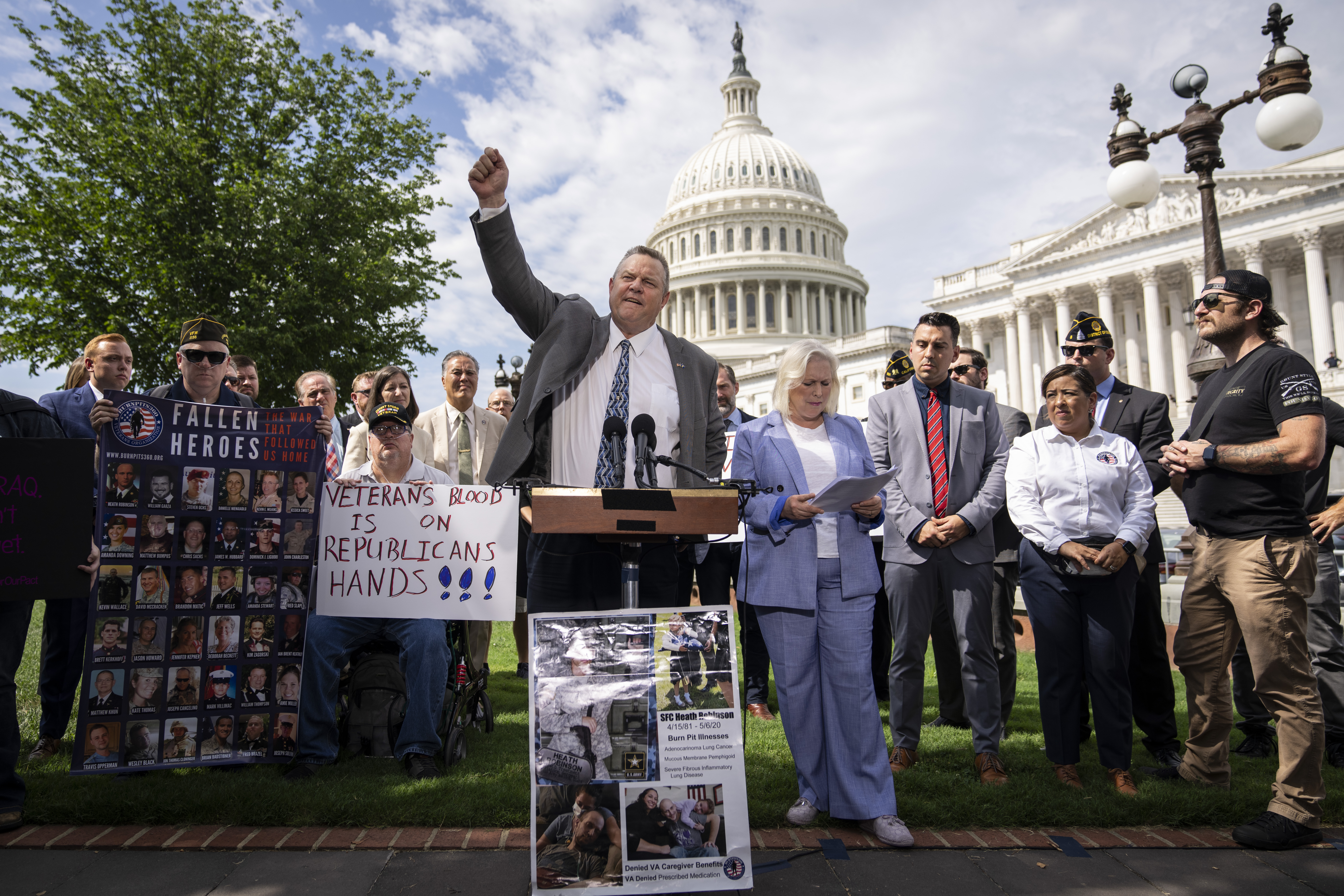
Washington offered Russia a deal that would bring home Marine veteran Paul Whelan and WNBA player Brittney Griner.
The Kremlin warned Thursday that a possible prisoner swap with the United States involving American basketball star Brittney Griner needs to be negotiated quietly without fanfare. U.S. Secretary of State Antony Blinken said Wednesday that Washington had offered Russia a deal that would bring home Griner and another jailed American, Marine veteran Paul Whelan. A person familiar with the matter said the U.S. government proposed trading convicted Russian arms dealer Viktor Bout for Whelan and Griner. Whelan, a corporate security executive from Michigan, was sentenced to 16 years in prison on espionage charges in 2020. He and his family have vigorously asserted his innocence. The U.S. government has denounced the charges as false. Asked about the U.S. offer, Kremlin spokesman Dmitry Peskov replied that prisoner swaps were typically negotiated discreetly behind the scenes. “We know that such issues are discussed without any such release of information,” Peskov told reporters during a conference call. “Normally, the public learns about it when the agreements are already implemented.” Biden meets with family of Marine veteran abducted in Syria nearly 10 years ago He emphasized that “no agreements have been finalized” and refused to provide further details. In a separate statement, Russian Foreign Ministry spokeswoman Maria Zakharova said that Russian and U.S. officials have conducted negotiations about possible prisoner exchanges and “there has been no concrete result yet.” “We proceed from the assumption that interests of both parties should be taken into account during the negotiations,” Zakharova said. Blinken’s comments marked the first time the U.S. government publicly revealed any concrete action it has taken to secure Griner’s release. The two-time Olympic gold medalist and player for the WNBA’s Phoenix Mercury was arrested at a Moscow airport in mid-February when inspectors found vape cartridges containing cannabis oil in her luggage. In a sharp reversal of previous policy, Blinken said he expects to speak with Russian Foreign Minister Sergey Lavrov to discuss the proposed prisoner deal and other matters. It would be their first phone call since before Russia sent its troops into Ukraine. Russia has for years expressed interest in the release of Bout, a Russian arms dealer once labeled the “Merchant of Death.” He was sentenced to 25 years in prison in 2012 on charges that he schemed to illegally sell millions of dollars in weapons. Griner’s trial on drug charges started in a court outside Moscow this month, and she testified Wednesday that she didn’t know how the cartridges ended up in her bag but that she had a doctor’s recommendation to use cannabis to treat career-related pain. The 31-year-old has pleaded guilty but said she had no criminal intent in bringing the cartridges to Russia and packed in haste for her return to play in a Russian basketball league during the WNBA’s offseason. She faces up to 10 years in prison if convicted of transporting drugs. On Wednesday, Griner testified that a language interpreter translated only a fraction of what was being said while she was detained at Moscow’s airport and that officials told her to sign documents, but “no one explained any of it to me.” Griner also said that besides the poor translation, she received no explanation of her rights or access to a lawyer during the initial hours of her detention. She said she used a translation app on her phone to communicate with a customs officer. Her arrest came at a time of heightened tensions between Moscow and Washington ahead of Russia sending troops into Ukraine on Feb. 24. Griner’s five months of detention have raised strong criticism among teammates and supporters in the United States. The story of Trevor Reed, the Marine veteran released in Russia prisoner swap The Biden administration has faced political pressure to free Griner and other Americans whom the U.S. has declared to be “wrongfully detained” — a designation sharply rejected by Russian officials. Washington has long resisted prisoner swaps out of concern that they could encourage additional hostage-taking and promote false equivalency between a wrongfully detained American and a foreign national regarded as justly convicted. In April, however, the government struck a deal to trade U.S. Marine veteran Trevor Reed for jailed Russian pilot Konstantin Yaroshenko. Matthew Lee and Eric Tucker in Washington contributed to this report.

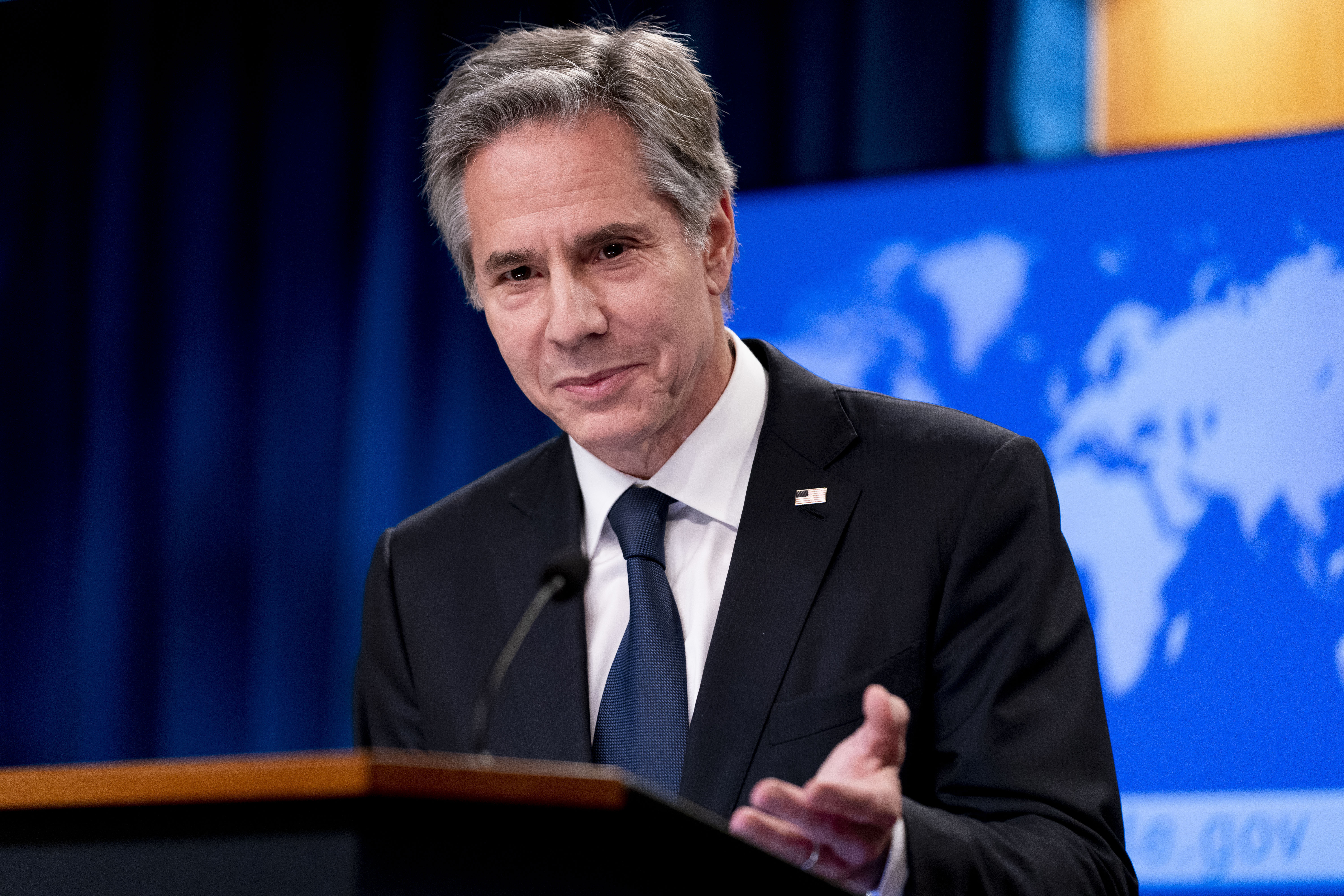
The measure was expected to be passed this week, but now faces an uncertain future.
A surprise deal on health care and environmental policies announced by Senate Democratic leaders Wednesday afternoon produced an unexpected casualty: the comprehensive toxic exposure legislation veterans advocates expected to pass this week. The Promise to Address Comprehensive Toxics Act — better known as the PACT Act — had been up for a procedural vote in the chamber with an expectation of final passage before the end of the week. The measure is the culmination of years of work by advocates to improve health care and benefits for veterans suffering injuries from burn pit smoke, Agent Orange spraying and other military contaminant exposure. It has been widely celebrated as a potential landmark legislative victory in veterans policy. Here are the veterans who will benefit from Congress’ sweeping toxic exposure bill The measure passed the Senate by a comfortable 84-14 vote in early June, and by a 342-88 vote in the House two weeks ago with significant Republican support. But on Wednesday, after technical corrections sent the measure back to the Senate for another procedural vote, 41 Senate Republicans blocked the measure, leaving its future uncertain. Republican lawmakers who had previously voted against the measure, including Sen. Pat Toomey, R-Pa., reiterated objections to how the money connected to the measure (about $300 billion over 10 years) would be accounted for in the regular appropriations process. But the block came just as Democratic leaders announced plans for a comprehensive budget reconciliation measure — a plan that the GOP caucus previously pledged to oppose, including increased efforts to snarl normal business in the chamber. Democratic leaders immediately attacked their colleagues putting political vendettas ahead of needed veterans benefits. “This eleventh-hour act of cowardice will actively harm this country’s veterans and their families,” said Senate Veterans’ Affairs Committee Chairman Jon Tester, D-Mont. “Republicans chose today to rob generations of toxic-exposed veterans across this country of the health care and benefits they so desperately need. “And make no mistake, more veterans will suffer and die as a result.” Today the Senate voted on bipartisan legislation that would’ve gotten toxic-exposed Washington state veterans the care they badly need and have earned. Republicans—who already voted for it before—let it fail. How dare they use veterans as a bargaining chip. — Senator Patty Murray (@PattyMurray) July 27, 2022 Eight Senate Republicans — including Senate Veterans’ Affairs Committee ranking member Jerry Moran, R-Kansas — voted for moving ahead with the bill. Republican leaders gave no public comment on the reasons behind the surprise move, or on what changes would be needed to move the legislation ahead. The Senate is scheduled to go on a month-long recess on Aug. 5, and advocates had hoped to have the PACT Act on the president’s desk before then. That timeline appears out of reach now. If it becomes law, about one in five living American veterans could benefit from the PACT Act. For veterans of the wars in Iraq and Afghanistan, the bill would establish a presumption of service connection for 23 respiratory illnesses and cancers related to the smoke from burn pits, used extensively in those war zones to dispose of various types of waste, many of them toxic. Deal on toxic exposure bill includes more VA staff, dozens of new VA medical clinics The bill also provides for new benefits for veterans who faced radiation exposure during deployments throughout the Cold War; adds hypertension and monoclonal gammopathy to the list of illnesses linked to Agent Orange exposure in the Vietnam War; expands the timeline for Gulf War medical claims; and requires new medical exams for all veterans with toxic exposure claims. Veterans who served in Thailand, Laos, Cambodia and Guam during the Vietnam War-era would be covered for the first time under the same Agent Orange presumptive policies as those who served in Vietnam itself. Senate Majority Leader Chuck Schumer, D-N.Y., and Sen. Joe Manchin, D-W.Va., announced the outline of the budget reconciliation deal with details to come next week. According to the Associated Press, officials said the plan would spend about $369 billion on energy and climate initiatives and $64 billion to extend expiring federal subsidies for people buying health insurance. It would also raise $739 billion in revenue over 10 years, the biggest chunk coming from a 15% corporate minimum tax. Democratic lawmakers and veterans advocates are scheduled to rally for PACT Act passage Thursday morning. Chamber leaders said they would keep working on finding a path forward for the legislation in coming days.

Federal prosecutors said old photos show the couple wearing uniforms of the KGB, the former Russian spy agency.
HONOLULU — A U.S. defense contractor and his wife who lived for decades under the identities of two dead Texas children have been charged with identity theft and conspiring against the government, according to federal court records unsealed in Honolulu. Walter Glenn Primrose and Gwynn Darle Morrison, both in their late 60s, who allegedly lived for decades under the names Bobby Edward Fort and Julie Lyn Montague, respectively, were arrested Friday in Kapolei on the island of Oahu. Prosecutors are seeking to have the couple held without bail, which could indicate the case is about more than defrauding the government to obtain drivers’ licenses, passports and Defense Department credentials. Primrose had secret security clearance with the U.S. Coast Guard and as a defense contractor and old photos show the couple wearing uniforms of the KGB, the former Russian spy agency, Assistant U.S. Attorney Thomas Muehleck said. Faded Polaroids of each in uniform were included in the motion to have them held. A “close associate” of Morrison said she lived in Romania while it was a Soviet bloc country, Muehleck said. Prosecutors said there is a high risk the couple would flee if freed. They also suggested that Primrose, who was an avionics electrical technician in the Coast Guard, was highly skilled to communicate secretly if released. The couple is also believed to have other aliases, Muehleck said. Lawyers for the couple declined to comment. A bail hearing is scheduled Thursday in U.S. District Court. Primrose and Morrison were born in 1955 and they attended high school together in Port Lavaca, Texas, and then went to Stephen F. Austin University, according to court records. They married in 1980. There is no indication in court papers why the couple in 1987 assumed the identities of deceased children who would have been more than a decade younger than them. But an affidavit filed by Special Agent Dennis Thomas of the State Department’s Diplomatic Security Service noted that the couple lost their home in Nacogdoches, Texas, to foreclosure that year. Court records don’t provide any information about what happened from the time they assumed their new identities until 1994 when Primrose, then about 39, enlisted in the Coast Guard as Fort, who would have been about 27. Primrose served in the service until 2016 when he began work for an unnamed U.S. defense contractor at the U.S. Coast Guard Air station at Barbers Point. “While he held that Secret clearance with the U.S. Coast Guard, defendant Primrose was required to report any foreign travel,” prosecutors wrote. “Investigation has revealed that defendant Primrose did not report several trips to Canada while he did report other foreign travel.” The couple is charged with aggravated identity theft, conspiracy to commit an offense against the U.S. and false statement in application for a passport. Melley reported from Los Angeles.






































